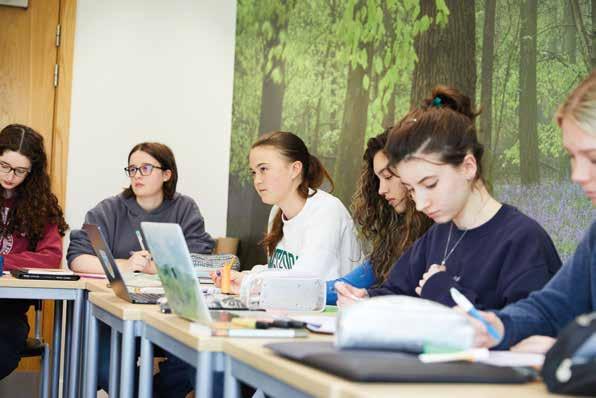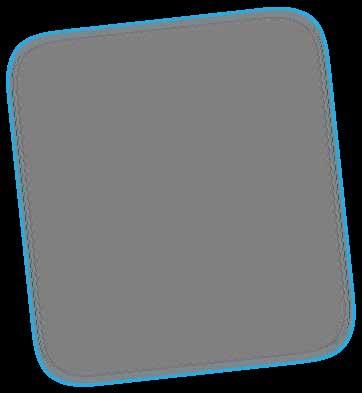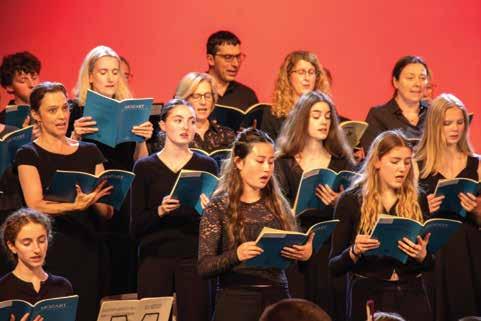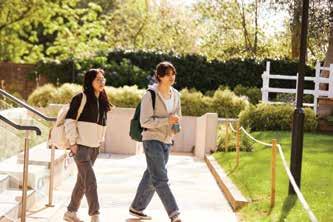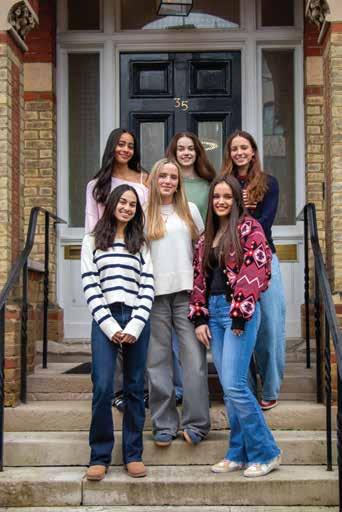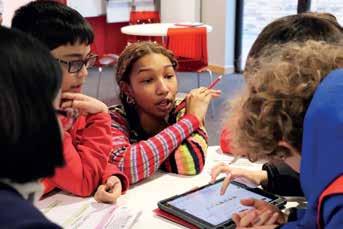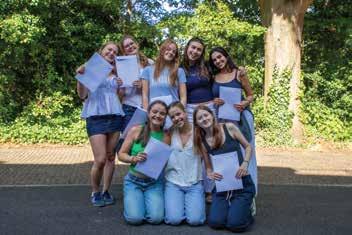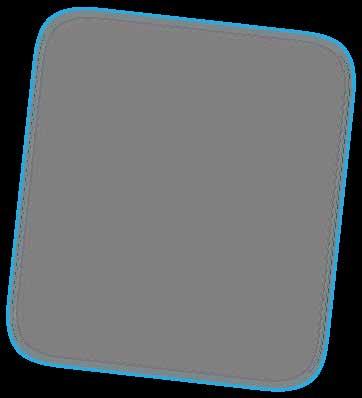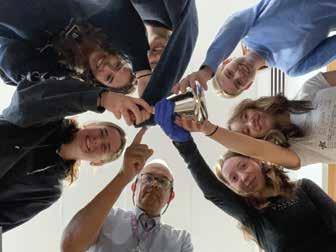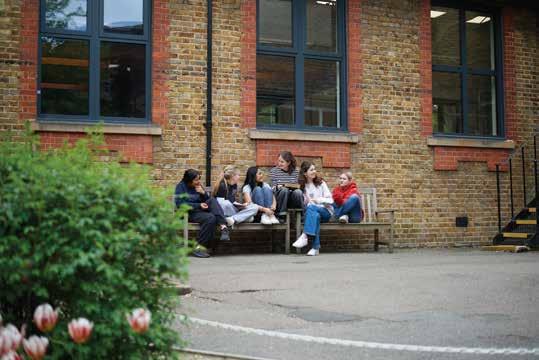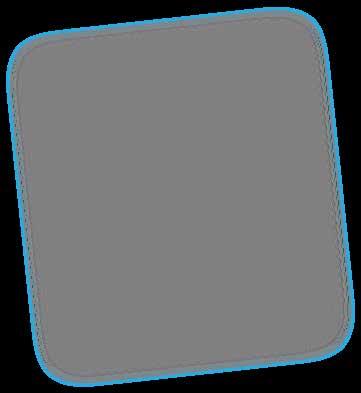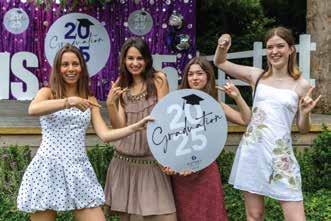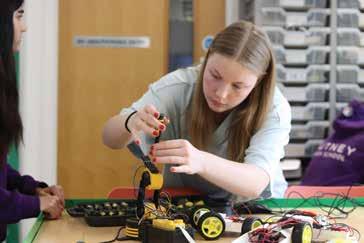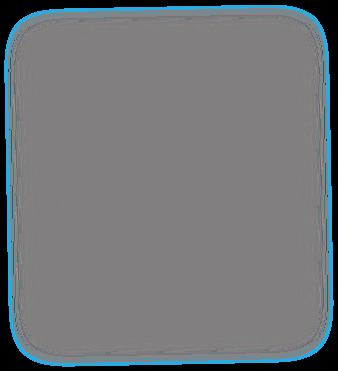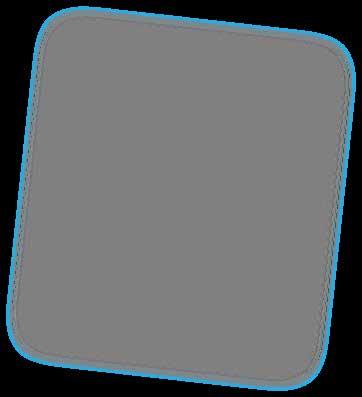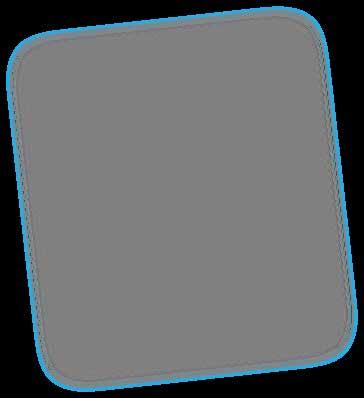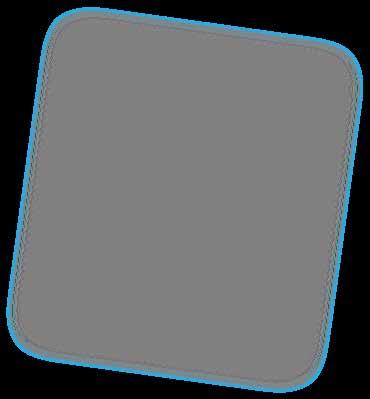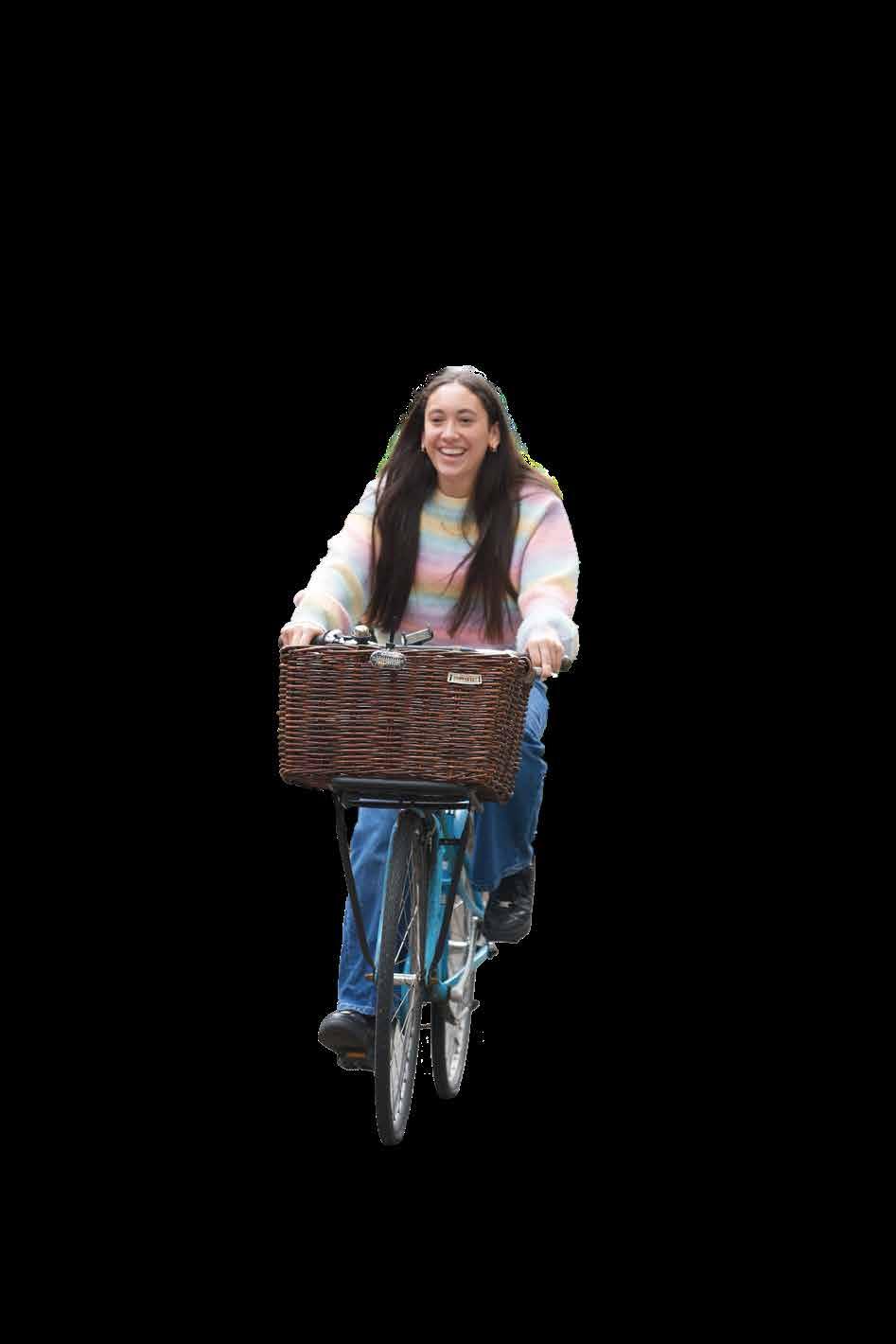




SIXTH FORM 2026-28
E VERY PIECE OF WORK IS A JOURNEY, WITH AN INTELLIGENT MIND BEHIND IT
KASIA HUGHES, CLASS OF 2019
Winner of the rising star award at the Golden Shears 2025,
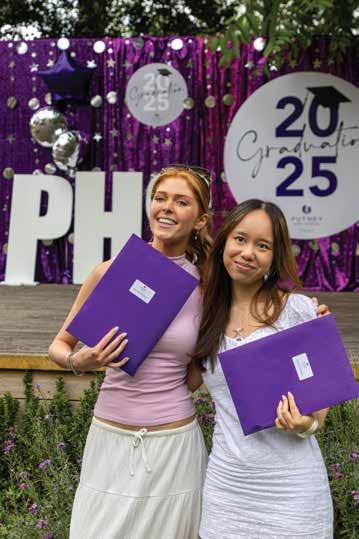
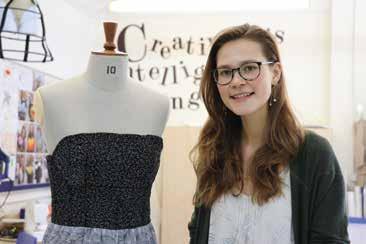
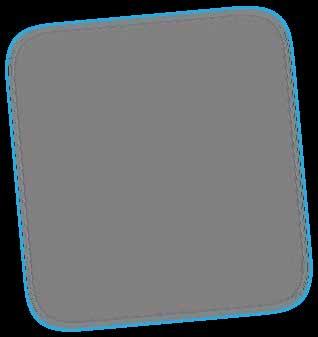
T HEY ARE TOMORROW’S LEADERS
TATLER SCHOOLS GUIDE 2025
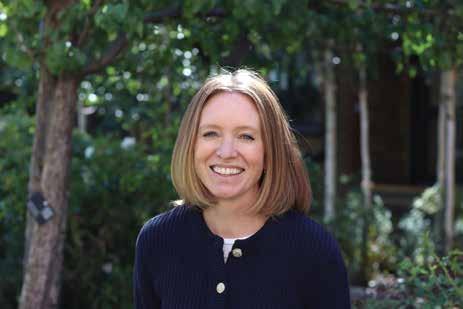






SIXTH FORM 2026-28
KASIA HUGHES, CLASS OF 2019
Winner of the rising star award at the Golden Shears 2025,



TATLER SCHOOLS GUIDE 2025

...A VIBRANT, AMBITIOUS AND INSPIRING COMMUNITY AT THE TOP OF ONE OF LONDON’S LEADING SCHOOLS.
Our outstanding academic results – at least 42% of A Level grades at A* in 2025 and 41% in 2024 – speak volumes, but they are only part of our story. Putney Sixth Form is home to a group of self-motivated, talented students with the spark and a thirst for life that brings energy and fun with it.
With a unique mix of academic excitement, truly modern scholarship and tailored 1:1 support, the next two years will empower you to not only achieve in your exams, but to leave us ‘real world ready’, confident to seize opportunities and ready to thrive in life.
Whatever your chosen university or career path, the Sixth Form offers you the support of an expert team of staff and an exceptional group of friends. A Level specialists will stretch and challenge you to excel both academically and personally, and through the many leadership, co-curricular and bespoke enrichment opportunities on offer, you will be empowered to prepare for and shape the future you choose.
We look forward to welcoming you soon.

Mrs Sophie Clegg Director of Sixth Form
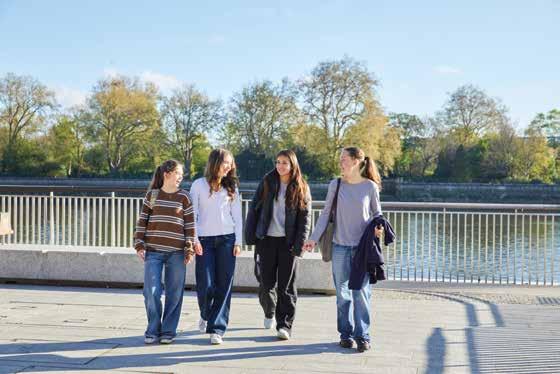
Offering intellectual thrill, real world readiness and unrivalled specialist support, Putney’s Sixth Form experience is second to none.
Our ethos of ‘modern scholarship’ will develop the academic rigour, innovation and intellectual risk-taking you’ll need to excel in your studies and beyond.
This, supported by a tailored programme of extension, will allow you to develop as a confident and independent scholar, thinking critically and originally, and building the skills and higher-level reasoning expected by Higher Education institutions and top employers.

Putney’s dedicated Sixth Form Centre – and indeed wider campus – is an inspiring space in which to study, collaborate and relax. From the Sixth Café and Common Room to the Futures Hub and seminar rooms, you will find it a friendly, inclusive environment where you can dive into your learning, take on leadership roles, start a society, try a new sport, embark on an EPQ or take part in our Athena academic enrichment programme.
At Putney, you really can shape your Sixth Form experience to reflect your passions and ambitions.
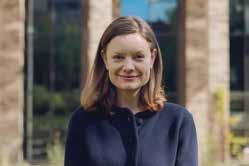
“One of the things I would say that distinguishes a Putney leaver is that not only are they in possession of a remarkable brain, but they really know what to do with it! That is a testament to our Science of Learning curriculum.”
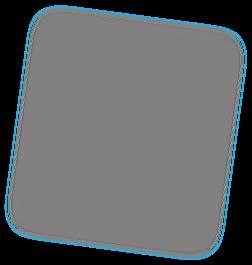

Phoebe Bradley Deputy Head Academic


Our students follow prestigious pathways to top universities in the UK and globally, and are trailblazing in their pursuit of exciting careers.
Whether you’ve set your sights on Cambridge, Camberwell or CalTech, our knowledgeable team of A Level subject tutors and higher education specialists are expert in preparing applications and will help you make informed decisions right from the start.


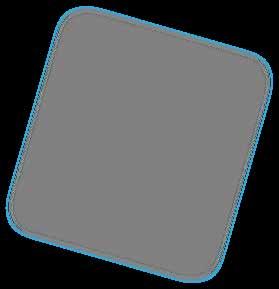
Expert, tailored guidance and training supports applicants to Oxbridge, Medicine and Law amongst others.
Our dedicated USA and International Universities Coordinator supports students, with previous destinations including Princeton, Stanford, Yale, Duke, Canada’s McGill and IE University Madrid.
“Putney goes above and beyond with higher education support. Whether it is US universities, European universities, degree apprenticeships or UK universities, you are never left floundering even if you're doing something less mainstream or want advice on practical things like student financing.”


Every year we see exceptionally high acceptance rates to Art and Fashion Colleges and to Music Conservatoires. Popular creative destinations include Camberwell College of Arts, Central Saint Martins, Chelsea College of Arts and the Royal Academy of Music. Many of our students go into creative fields, and on to run successful businesses of their own.

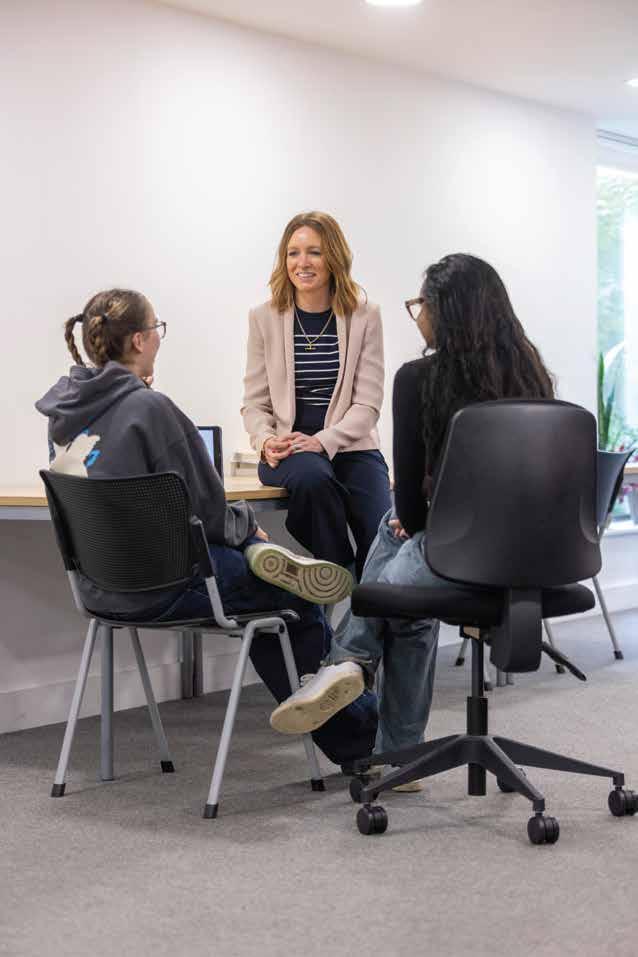
The sheer array of destinations is dazzling. There really is no narrow path as you will see on our destinations page.
A Level study allows you to pursue in depth the subjects that really interest you. Our specialist tutors bring the curriculum to life with energy and expertise.
Small seminar classes encourage you to delve deeper. You will be challenged and inspired to think critically and creatively.
• Small seminar classes
• Subject specialist teachers (five hours per week per subject)
• Independent study (minimum four hours per week per subject)
• Develop research, analytical and organisational skills
• Build an impressive academic CV
We believe you will excel in your studies if you follow your passions and choose the subjects you enjoy. We do our best to build the timetable around your choices. Where class sizes are particularly small, there may be a reduced period allocation, reflecting the highly personalised tuition you will receive. The options are as follows:
3 A LEVELS
3 A LEVELS + EPQ
4 A LEVELS (the 4th is likely to be Further Mathematics).

“The teachers help you to understand how, as an individual, you learn best and encourage you to explore the many available resources.”
MAI, YEAR 13


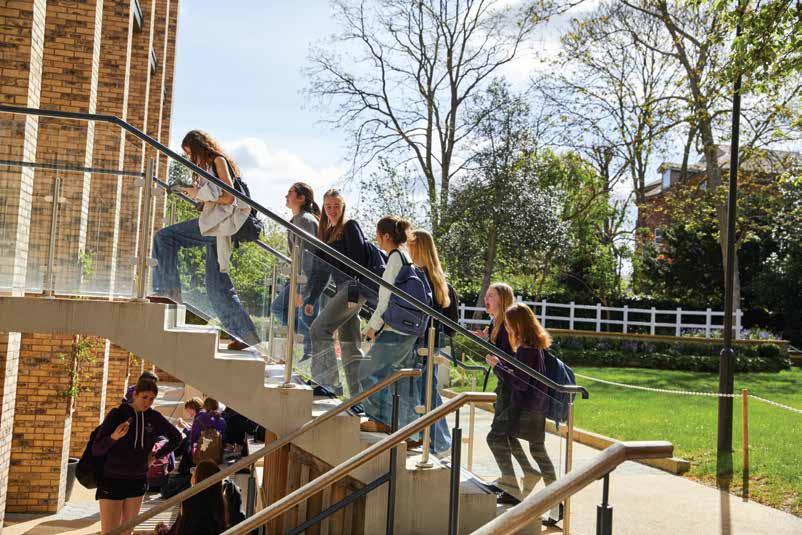


Should aggressive dog laws target specific breeds or individual dogs?
The Extended Project Qualification (EPQ) is a core part of Sixth Form study undertaken in Year 12. It is designed to stretch you intellectually as you research, build and present a project in your own field of interest –great preparation for the independent learning style of university.
These are a few recent titles chosen by students for their EPQ. What will you choose?
To what extent does the frontal lobe of the brain affect human behaviour?
A dissection of Dutch Protestantism in the 17th century
To what extent does Haruki Murakami’s work reject an ‘Orientalist’ concept of Japan?
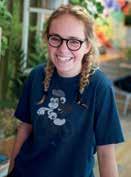

• At least 5 GCSEs at either 8 or 9 and three grades at 7
• GCSE grade 8 or 9 in your chosen A Level subjects
• GCSE grade 7 or above in Mathematics and English Language
• For two science A Levels, or Maths alongside a science, at least a grade 8 will be needed in both subjects The following grade guidelines are not designed as a barrier to entry, but simply to ensure you will enjoy your sixth form years and can hit the ground running in your A Level studies.
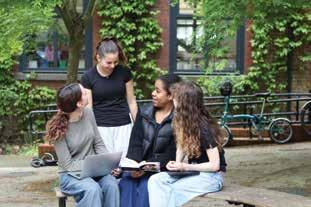

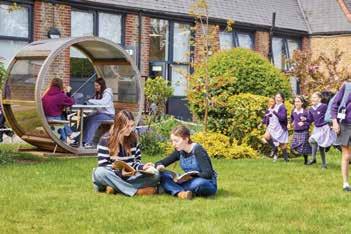

The academic curriculum is accompanied by a bespoke series of lectures, Futures sessions, enrichment programmes and competitions, all designed to expand your thinking and prepare you for successful applications to higher education and the fascinating careers that lie ahead.

“Futures has provided me with the background knowledge I need to properly understand the content, and benefit from the structured environment to develop my thinking and clear reasoning. Supplemented by my own reading, online courses and general philosophical exploration, I feel I’ve built a strong foundation for further study.”
SOPHIE, YEAR 12
The Athena Programme is Putney High School’s unique programme of academic extension.
In the Sixth Form, Athena Gold allows you to tailor your educational path beyond the curriculum, in line with your interests and ambitions. Drill into the topics you are most passionate about as you build an impressive academic CV with the guidance of subject experts and thought leaders.
Explore topics from “Think like a Lawyer: the Legal Definition of Murder” to “Game Theory and Freedom vs Security: Which is better?”
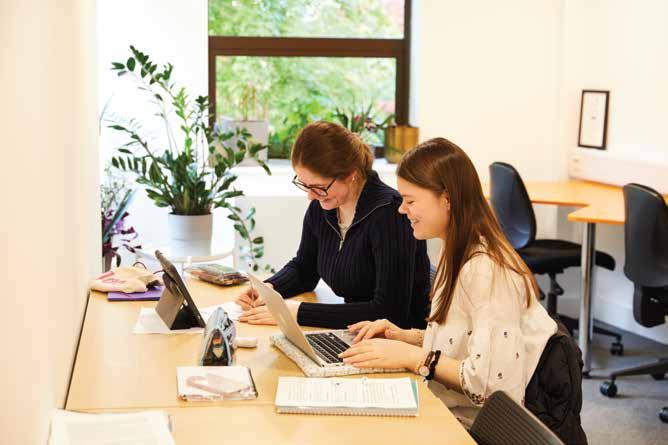
Futures sessions and Electives are just some of the many opportunities for you to research, discuss and present ambitious work through university-style seminars and presentations.
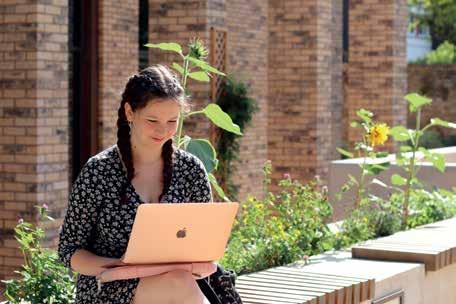
The Sixth Form LEAP Lecture series (Limitless Education at Putney) and Putney Ideas Exchange (PIE) simulate the university experience, covering topics as diverse as the political missteps of the last Emperor of Mexico to cutting-edge research on AI and particle physics.
• Epigenetics: is your genome your destiny?
• Observing Higgs Boson using artificial intelligence
• Deconstructing performance magic
Attend one of our PIE+ ‘An Audience with...’ events to hear challenging ideas and engage with prominent guests from business leaders to philosophers to neurosurgeons.
From Arkwright Scholarships to Oxbridge Essay Competitions and Maths or Science Olympiads, there is plenty to stretch and challenge you. Students regularly take part in and have great success achieving:
• Internships at The New York Times
• Places on Oxford’s John Locke Institute Summer School
• Minds Underground essay competition wins
• Oxbridge College essay prizes
...to name a few!


Much as we love SW15, there is a world of opportunity beyond our gates. We are regulars at the many exhibitions, theatre productions and other inspiring events that London has to offer. Subject, sport and choir trips will take you around the UK and abroad to destinations such as Norway and Morocco.


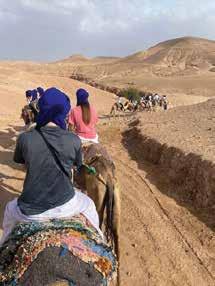
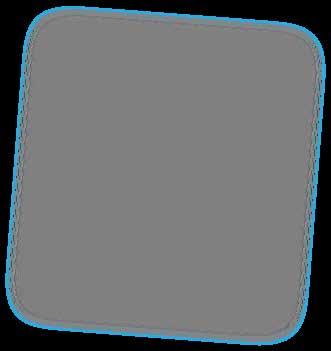
"Putney gave my daughters a wonderful springboard to follow their dreams, one at The Royal College of Art in The Hague and the other on a scholarship at Duke in the US. The support received played a huge part in their success.”
PARENT OF A PUTNEY LEAVER



Our sixth formers are role models to younger students and volunteer both in school and the wider community. Why not start a club or society, or coach a school sports team? Or help and support literacy through our partnerships with local primary schools?
Every year students complete their Gold Duke of Edinburgh awards and there are regular fundraisers for local foodbanks and our House Charities. The biggest fundraiser of the year is our famous “Putney Does Strictly” at Christmas – a hot ticket!
Our extensive PSHE curriculum will give you all the skills you need to transition confidently from Sixth Form to university and beyond. Workshops and talks include:
• Understanding student finance
• Shopping on a budget
• Backpacker safety
• Bicycle maintenance – how to change an inner tube
• Understanding tenants' rights
• Dental care dos and don’ts

“I’m a STEM prefect and I’ve really enjoyed making friends in younger years. I help to run STEM club for Years 7 to 9 and Motorsport and Engineering Clubs – all a lot of fun.”
ENGINEER, YEAR 12




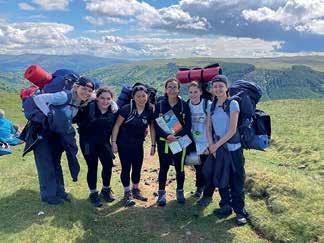



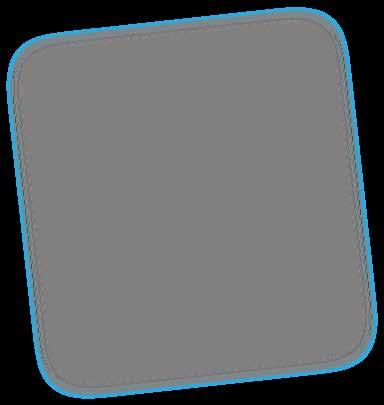

From talks with professionals and business leaders, to work experience, careers ‘speed dating’ workshops, entrepreneurship competitions and our biennial careers fair, our knowledgeable team and well-resourced careers department will help you to explore and understand the many options open to you.
Many brilliant ideas have started life in our Innovation Centre, prototyping spaces and Sixth Form Board Room. We'll help you to develop a creative, entrepreneurial mindset, build your employability, your problem-solving, and your resilience!
Work experience is generally undertaken in the summer of Year 12. Here are just a few opportunities some of our students have taken up:
• Unilever STEM work experience programme
• Advanced apprenticeship in naval engineering
• Two-week course in Boston on an “Introduction to Relativity: From Cosmic Rays to Black Holes.”


“Putney were really supportive in helping find work experience. I worked at a veterinary practice and loved how different each day was.”
13
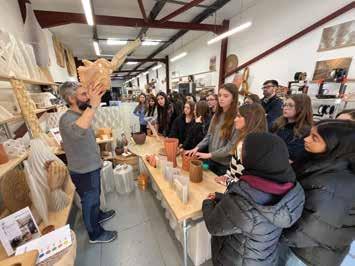

• Summer course at the engineering school of Politecnico in Milan, exploring the dynamics of racing cars.

“Over the summer I had work experience with the ex-head of couture at Alexander McQueen, Deborah Milner. It was really exciting to learn about different techniques, fabrics and materials.”
FRAN, YEAR 13
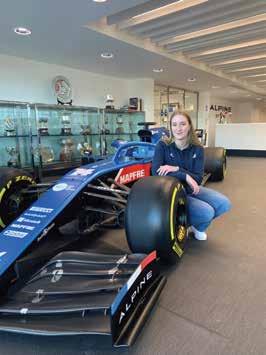
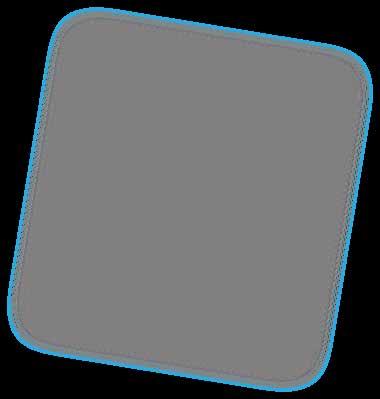

Our alumnae return regularly to support those following in their footsteps. There are talks, Working Breakfasts and alumnae lunches to connect you with the right people and help you make informed choices on the courses and career paths open to you.
Many Putney alumnae have gone on to become household names: broadcaster and journalist Sophie Raworth and multi-Oscar winning costume designer Jenny Beavan; others have been named as pioneers or leaders of the future: robotic surgeon, Aimee Di Marco and investment banker, Anoushka Mehta to name a few.
As part of the GDST you will benefit from an even wider alumnae network and resources from insight days, business networking and training to contacts in leading global organisations including the LSE, PwC, Rolls-Royce, Barclays and the Royal Opera House.
In Year 12 the GDST LEAD programme in partnership with the London School of Economics and Political Science (LSE) is an innovative Leadership and Enterprise programme helping our students to develop the transferable skills they’ll need as future leaders and entrepreneurs.


“Whether you joined at 4, 11, or like myself at 16, your level of involvement, the strength of your friendships and your connection to teachers does not vary. Some of my strongest friendships are with girls I met 12 months ago while trying to find the Sixth Form diner!”
MIMI, WHO JOINED IN YEAR 12
With advice and support from a dedicated mentor from LSE, you will prepare a business plan and present at a special showcase event.
The GDST Space Technology Diploma offers a taste of pre-university computer science and real world space science. Hone your Python programming skills and learn more about satellite and space industry tech for this Year 12 diploma in partnership with NASA Develop – great preparation for industry-level internships.

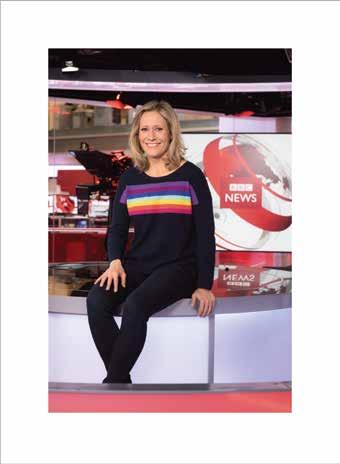


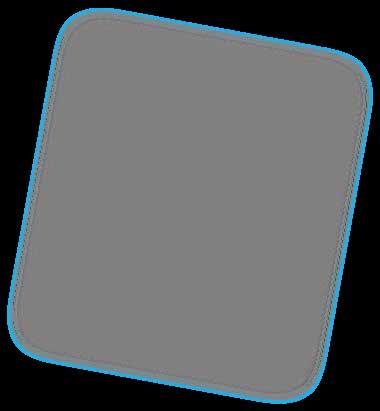

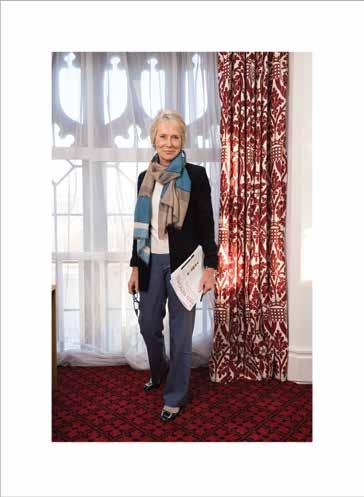

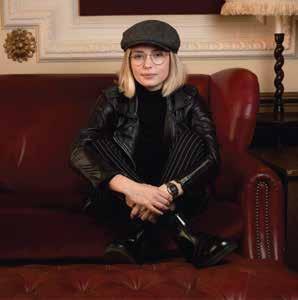

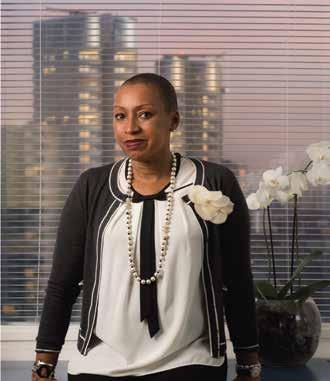
Putney is a kind and caring community –open-minded, inclusive and down-to-earth. Everyone is valued and celebrated for who they are, so expect to feel a real sense of belonging and to build meaningful and lasting friendships. The Year 12 and 13 joint team building day is not only great fun but guaranteed to help you make new friends.
Your happiness and mental wellbeing are our number one priority. Your tutors are part of an extensive pastoral team who will get to know you, help you manage your time and support you 1:1, both academically and on a personal and emotional level.
Whether you want to keep fit, just play, or compete at the highest level, there are options in both team and individual sports.
We have been voted a Top School for Sport for the last four years, so this is the perfect time to continue with a sport you love, or to pick up something new.
We have on and offsite facilities for lacrosse, netball, rowing, gymnastics, football, badminton, pilates and running, or you might enjoy dance or strength and conditioning in the Sixth Form Fitness Suite. A short distance away you’ll find our playing fields, athletics track and of course, Putney’s well-equipped Boathouse, right on the famous Tideway at Putney Bridge.

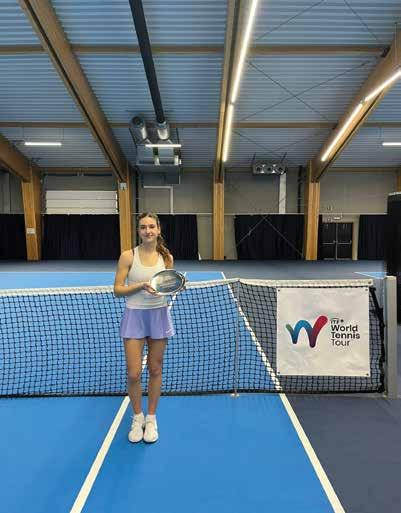
“The sporting community at Putney is incredible, I’ve loved rowing and have made friends across the school.”
ISABELLA, YEAR 13


Life at the top of the school gives you the platform to develop many skills and aptitudes. The Head Student Team and Prefect roles are hotly contested or you might become a House Captain, lead Medical Society, edit a student magazine, or take on one of the many club, or other student leadership roles on offer.
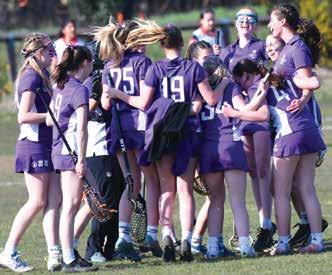



“I started playing lacrosse in Year 12. I'm not great at it, but I really, really enjoy it. My team plays a match every week and this year we came top 16 in the Nationals which was exciting.”
CELIA, YEAR 12
The Sixth Form musical is a highlight of the year. Take the lead in the House Music or Drama Festival; you could write, produce, compose, conduct or perform. There are theatre trips, acting and writing masterclasses, a Dance Show and so many choirs and orchestras to get involved in; plenty to feed and showcase your creativity.

“Sixth Form Drama is full of fun and fantastic opportunities from the many brilliant productions to House Drama and the chance to see some great theatre, create your own work and learn from professional performers.”
CHARLOTTE, YEAR 13
While we are proudly a school designed for and dedicated to the needs of girls, we enjoy the many opportunities to partner with other schools.
With Fulham Boys School:
• The Common Room Speaker Series (Higher Education subject lectures)
• Oxbridge interviews and admissions test support
• Economics A Level trip
• Collaborative essay competitions
• Aspects of our Future Medics programme
With the West London Schools’ Partnership:
• Economics conference
• Neuroscience talks
• Model United Nations events
• Debating competitions
• Careers Fairs
With Eton College:
• Modern Foreign Language conference
With Wetherby Boys’:

• US Universities ‘speed dating’ event
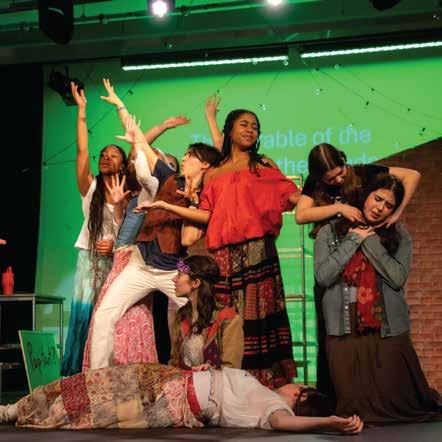
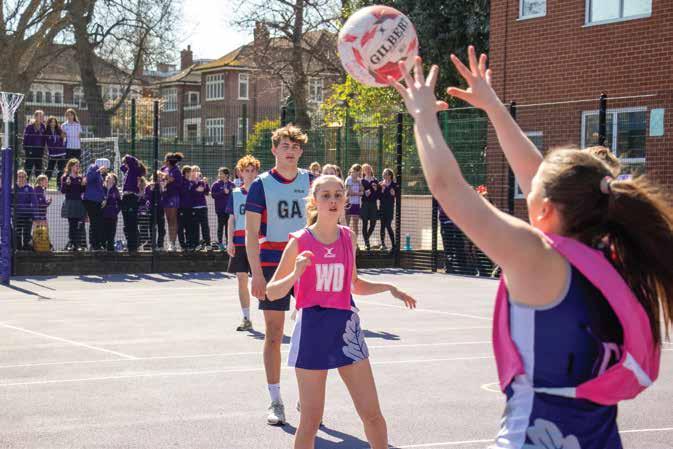
Putney really allowed me to prepare for university. The career talks and visits from returning alumnae helped me decide to pursue accountancy. It’s such a good starting point for other areas of finance; I’m excited to see where it leads me.
I joined Putney in the Sixth Form on a bursary. I was nervous at first but everyone was so nice, it wasn’t hard to make friends. The teachers took the time to find out how I worked and learnt best. Putney really celebrates you for who you are and what you love to do. There are so many opportunities to showcase your talents.
I was a Drama prefect and was then elected to the Student Leadership team – such great team and leadership experience.
Business, Drama & Mathematics
Queen Mary University
Accountancy with PwC apprenticeship
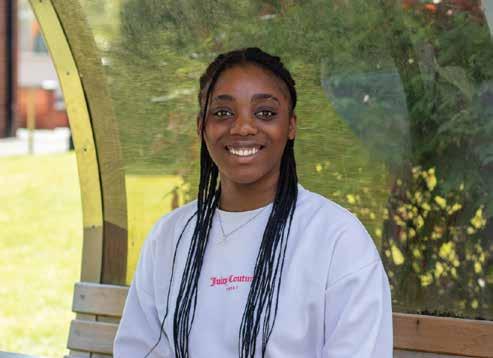
Putney really pushes you to go beyond the curriculum because there are so many opportunities and you get a lot of freedom. I chose History because it is a combination of everything: Literature, Politics, Religion.
A LEVELS: English, History & Mathematics plus an EPQ University of Cambridge History
Putney offers a lot of Oxbridge support. Futures sessions involved research projects, presentations and reading beyond the curriculum. The interview practice was really helpful too.
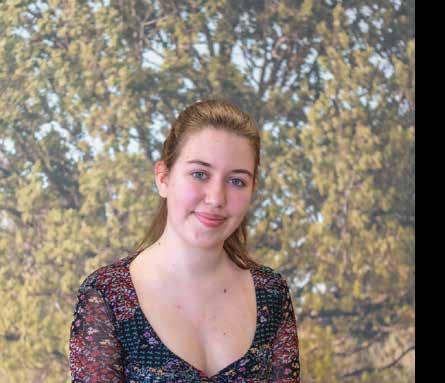
I’ve enjoyed debating and run both the Feminist and History Societies, which helped me to build a strong personal statement and to get a good understanding of what I really enjoy. The friendships I’ve made will last me well beyond school.
VAN DE GRAMPEL
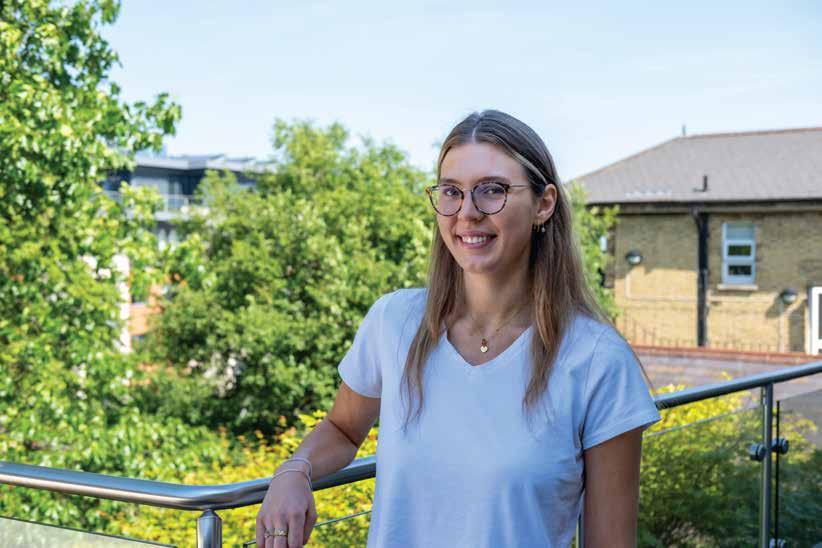
Putney encourages you to choose the subjects you enjoy. My favourite is Economics and it's something I'll be able to apply to my future studies – I have an unconditional offer to study Business Administration at IE Madrid. I'll be doing two years in Segovia and two years in Madrid.
Putney has really supported me with the various subject clinics and the International Universities Coordinator helps with applications. There's always great support available.
The Sixth Form is really welcoming and with no uniform, you can wear what you feel identifies you. The way the two year groups
integrate is special too. At the start of the year we did a central London scavenger hunt in mixed groups of Years 12 and 13, which was great fun. You also meet students lower down the school through all the clubs and sport teams. I've played in the netball team, run Psychology Club and been Stark house captain.
& Psychology plus an EPQ
IE Madrid Business Administration


Putney offers so many choices. I think it’s important to have balance and to keep your options open and Putney really supported me in that.
We have all been very much encouraged to find and do our own thing, academically and outside the classroom. I played netball and lacrosse, rowed and did lots of art.
The Oxbridge support is excellent. I went to Working Breakfasts and spoke with previous applicants to hear about their experiences. Weekly Futures sessions gave us interview and presentation practice.
Putney is such an open and friendly place. There's always so much going on and I’ve made a lot of new friends in the Sixth Form.
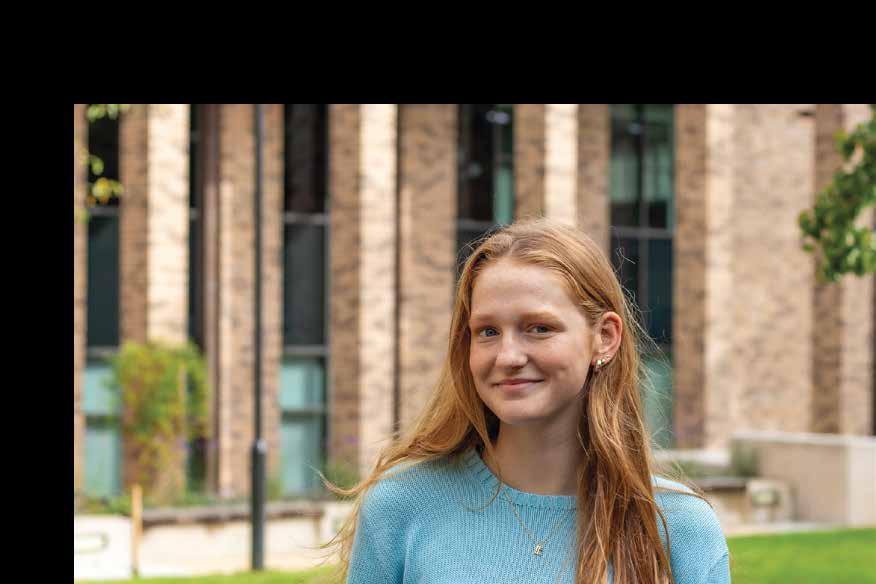


I've always loved creative subjects and studying Textiles in particular has allowed me to push my creative boundaries. Putney was great in letting me choose the subjects I really enjoyed. It's so important to love what you're doing. I'm going to Edinburgh to study History of Art but I want to pursue Fashion textiles in the future.
Outside of academics I've had such a lot of fun too. The Sixth Form is really friendly and Year 12 and 13 mix very well. There was the History of Art trip to Venice and I helped to organise the teachers’ panto, which had a Love Island theme!
A LEVELS:
DT: Fashion & Textiles, History of Art & Psychology
Edinburgh University History of Art
Being a gymnastics captain has meant a lot of time in the Sports Hall, but I was also a textiles ambassador, running textiles clubs and helping younger students. I was so happy to be elected to the student leadership team and to have weekly meetings with our Head, Ms Sharrock.
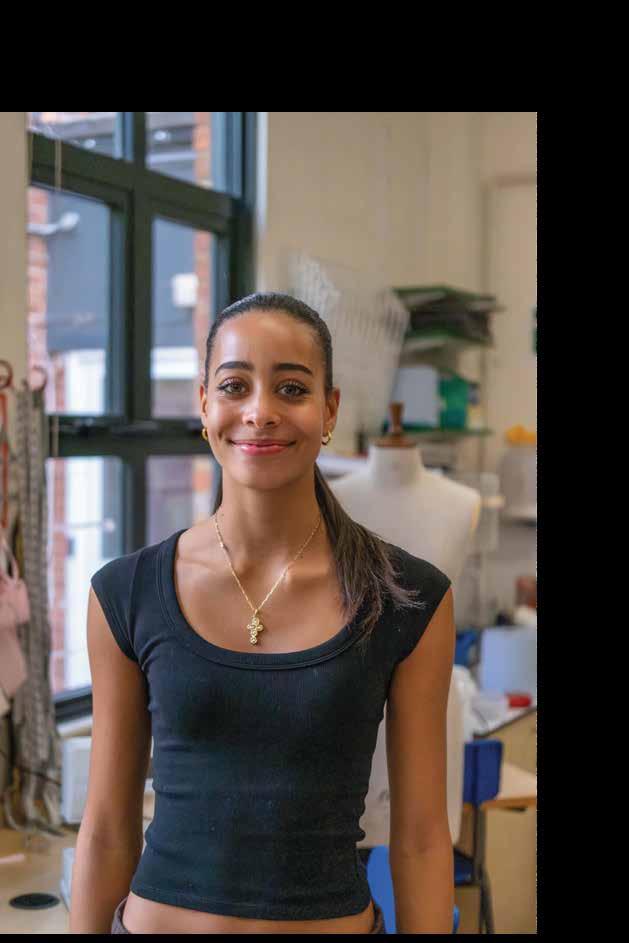


Biology, Chemistry & Geography plus an EPQ
University of Liverpool Veterinary Medicine
I really enjoy the sciences but my favourite subject is Geography – I love learning about geopolitical situations around the world.
I will be studying Veterinary Medicine at the University of Liverpool with the aim of becoming a veterinary surgeon. I'd love to work all over the world with different species and exotic animals, particularly South East Asia. My EPQ is on the aggressive dog laws around XL Bullies.
Putney were really supportive in helping find work experience. I worked at a veterinary practice and loved how different each day was, and seeing all the animals. I also worked at a stables and a farm.
Putney's sixth form community is close-knit. There’s a lot of support and a huge amount of opportunity. You have access to so many resources and you can run your own clubs. I helped organise Young Biologists club with friends. Academically too there are clinics if you have questions or need help.
Putney offers so many opportunities, clubs and sports and it's so important to take advantage of them and try new things. Don't be afraid to branch out!
Putney has really helped me find my niche and blossom academically. After university I’m hoping to undertake the law conversion course with an interest in family or commercial law.
I found the revision clinics at Putney helpful. There were numerous sessions on how to write a unique personal statement. We also
I’ve made friends for life at Putney. I’ve watched old friends grow and made new friends from clubs, a capella group and choir. The school drama productions are a wonderful thing to do. You don’t have to be a performer; you can take a role in tech or design the stage, or costumes, or backdrops if you’re an artist.
A LEVELS:
English, History & Religious Studies
University of Cambridge
Theology, Religion & Philosophy of Religion

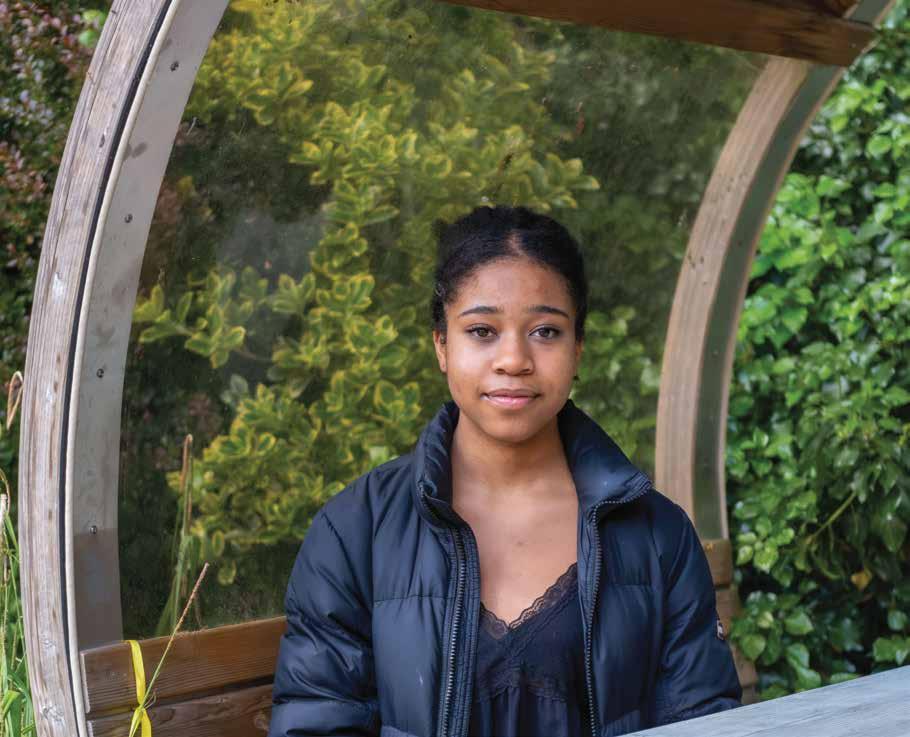


I hope to study engineering – probably mechanical engineering but I’m also looking at aerospace and engineering degree apprenticeships.
I also have an Arkwright Engineering Scholarship and Putney’s Design Technology team were so much help with my application. I love prototyping so I designed a portable wind turbine for use after natural disasters. Putney supported me with my design, CAD modelling and prototyping.
Mathematics, Physics & Psychology plus an EPQ
Putney goes above and beyond with higher education support. Whether it is US universities, European universities, degree apprenticeships or UK universities, you are not left floundering even if you're doing something less mainstream or want advice on practical things like student financing.

INTERNAL AND EXTERNAL SCHOLARSHIP
Our scholarship programme is designed to recognise potential and offer opportunity. In the Sixth Form, Academic, Art, Design Technology, Drama, Music and Sport scholarships are available. We also award unique travel scholarships to internal applicants, for students studying Modern Foreign Languages and Sciences.
Students are welcome to apply for more than one and it is not uncommon for several to be awarded.

Putney is part of the Girls’ Day School Trust (GDST). We are academically selective and ‘means blind’. This means that we do everything we can to ensure that students with promise are able to benefit from a Putney education regardless of their families’ ability to afford fees.
For students entering in Year 12, a number of means-tested bursaries are available for up to 100% of school fees.
Ann Claire, Music Scholar
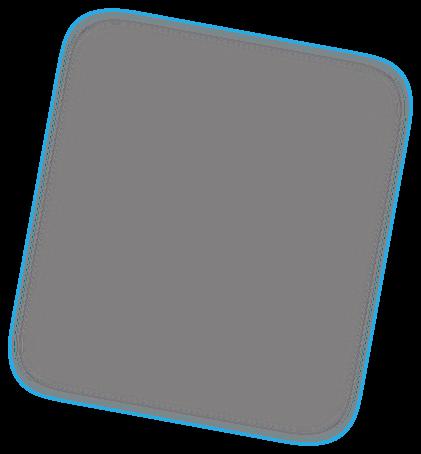

To apply, please tick the box on the main 16+ application form. The admissions team will then contact you with further information on how to submit an application
Once you have submitted your bursary application, the GDST, who handle all bursary assessments, will ask for confirmation of your family’s residency status as well as a declaration of income
Bursary awards will vary depending on individual circumstances and applicants are notified of whether they qualify for a bursary – and if so, the value of that award –when they are notified of the outcome of their application for a place at the school.
Please refer to our website for more information about assessment and eligibility.
MANCHESTER MANCHESTER
EUROPE
UNIVERSITY
IMPERIAL
KING’S
BATH
Architecture
Biology
Politics & International Relations
Politics with Economics
BRISTOL
Chemistry
Classics
Geography
History
History of Art & Spanish
International Business Management & French
Mechanical Engineering
Social Policy
BRUNEL Medicine
CAMBRIDGE
History
Modern & Medieval Languages
Theology, Religion & Philosophy of Religion (2)
CARDIFF Medicine
CITY ST GEORGE’S
Medicine
DURHAM
Ancient History
Chemistry (2)
Classics (2)
Economics
Finance (2)
Geography
History
Liberal Arts
Mechanical Engineering
EDINBURGH
Business & Economics
Chemistry
Economics
English Literature (2)
Finance & Business
History (2)
History of Art
Social Policy & Economics
EXETER
Art History & Visual Culture & History
Geography
Modern Languages
Natural Sciences
Politics & International Relations Psychology (2)
GLASGOW Zoology
IMPERIAL COLLEGE Biological Sciences
KING’S COLLEGE LONDON Natural Sciences
LEEDS Geography Natural Sciences Physics
LIVERPOOL Veterinary Science
LOUGHBOROUSH Geography
LONDON SCHOOL OF ECONOMICS Geography with Economics
MANCHESTER
Drama
Economics & Politics
English Literature & Italian History
Psychology
MANCHESTER MET Fashion Design & Technology
NORTHUMBRIA Fashion Design & Marketing
NOTTINGHAM Medicine (2) Natural Sciences
OXFORD History Geography Medicine
SOAS
International Relations
SOUTHAMPTON
Economics & Business Management
ST ANDREWS
Physics
Theological Studies
SURREY
Law
Psychology
UNIVERSITY COLLEGE LONDON
Applied Medical Science
Classics & The Ancient World
Economics & Statistics
Geography & Economics
Global Humanitarian Studies
History
Neuroscience
Psychology & Language Sciences (2)
WARWICK
Economics & Management
Global Sustainable Development
Mathematics
YORK
Film & Television Production
History of Art
History
EUROPE
UNIVERSITY OF AMSTERDAM
IE MADRID
USA
BRYANT UNIVERSITY
OHIO STATE UNIVERSITY
UNIVERSITY OF CHICAGO
Our many US University offers in recent years have included a Research Fellowship to Columbia as well as places at CalTech, Chicago, Colgate, Duke, Johns Hopkins, Princeton, Southern California, UPenn and Canada’s McGill amongst others.






HAVE GONE TO OXFORD OR CAMBRIDGE
to study subjects including:
Engineering, English, History, Human, Social & Political Sciences, Medicine, Modern & Medieval Languages, Music, Natural Sciences, Theology, Religion & Philosophy of Religion and Veterinary Medicine.

DEGREE APPRENTICESHIPS
Goldman Sachs
Software Engineering, Queen Mary University of London
PwC
Accounting and Finance, Queen Mary University of London
MY CAREER HAS BEEN AND REMAINS AMAZING. LOOK WHAT YOU STARTED… AND THAT LOOK ON SOMEONE’S FACE WHEN YOU SAY YOU’VE BEEN TO PUTNEY... IT'S MAGIC!
Alumna, Class of 1991
CONFIDENT, RESILIENT RISK TAKERS WHO AREN'T AFRAID TO CHALLENGE, TO EXPERIMENT AND WHO MORE THAN HOLD THEIR OWN IN TUTORIALS AND SUPERVISION IN A WAY MANY OTHER YOUNG PEOPLE CANNOT WHEN THEY FIRST ARRIVE AT UNIVERSITY.
Professor Deborah Prentice, Vice Chancellor, University of Cambridge, on our students


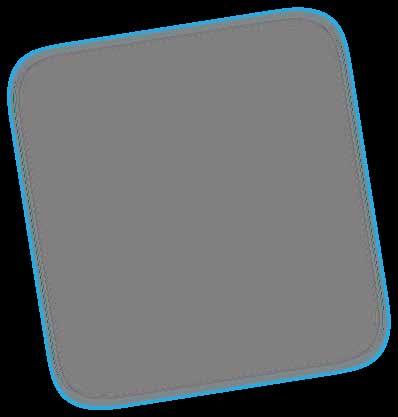
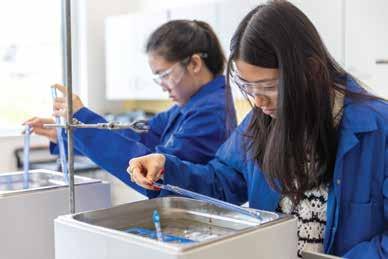
IN 2025 SPORTS SCHOLARSHIPS TO US UNIVERSITIES INCLUDED:
Ohio State and Bryant, Rhode Island
2025 MOST POPULAR DESTINATIONS... ...were Bristol, Durham, Edinburgh, Exeter and UCL.
2025 MOST POPULAR COURSES INCLUDED: Biological and Neurosciences, Economics, Engineering, Geography, History and Medicine. Our students have gone to some of the world’s leading creative arts & design institutions including: Camberwell College of Arts, The Royal Academy of Music, The Royal Central School of Speech and Drama, Nottingham Trent, Kingston University, Ravensbourne, the University of the Arts and IE Madrid, Spain.

“My world view opened up. Putney taught me that I could be what I wanted to be –even if I didn't know quite know what that was. It taught us that we were not afraid of hard work, that we had a voice, that learning never stops, that we as girls deserved to be at the table and running the show.”


ART
BIOLOGY
BUSINESS
CHEMISTRY
CLASSICAL CIVILISATION
CLASSICAL GREEK
COMPUTER SCIENCE
DESIGN TECHNOLOGY: FASHION & TEXTILES
DESIGN TECHNOLOGY: PRODUCT DESIGN
DRAMA & THEATRE
ECONOMICS
ENGLISH LITERATURE
EXTENDED PROJECT QUALIFICATION (EPQ)
GEOGRAPHY
HISTORY OF ART
HISTORY
LATIN
FURTHER MATHEMATICS
MATHEMATICS
MODERN FOREIGN LANGUAGES
MUSIC
PHYSICAL EDUCATION
PHYSICS
POLITICS
PSYCHOLOGY
RELIGIOUS STUDIES
A Level Art enables students to pursue careers in all the creative industries (and more widely) including art, design, architecture, graphics, fashion, textiles and film. It is both challenging and exciting, introducing a broad understanding of the visual arts and associated concepts. Emphasis is on visual skills, personal research and development.
Students experiment and record using different techniques and processes as the basis for creative and skilled work. This course is appropriate for students wishing to follow a career in the Arts, whether Fine Art or Applied Art, and involves the creation of a broad portfolio of work vital for any student wishing to study Art at Foundation or Degree level.
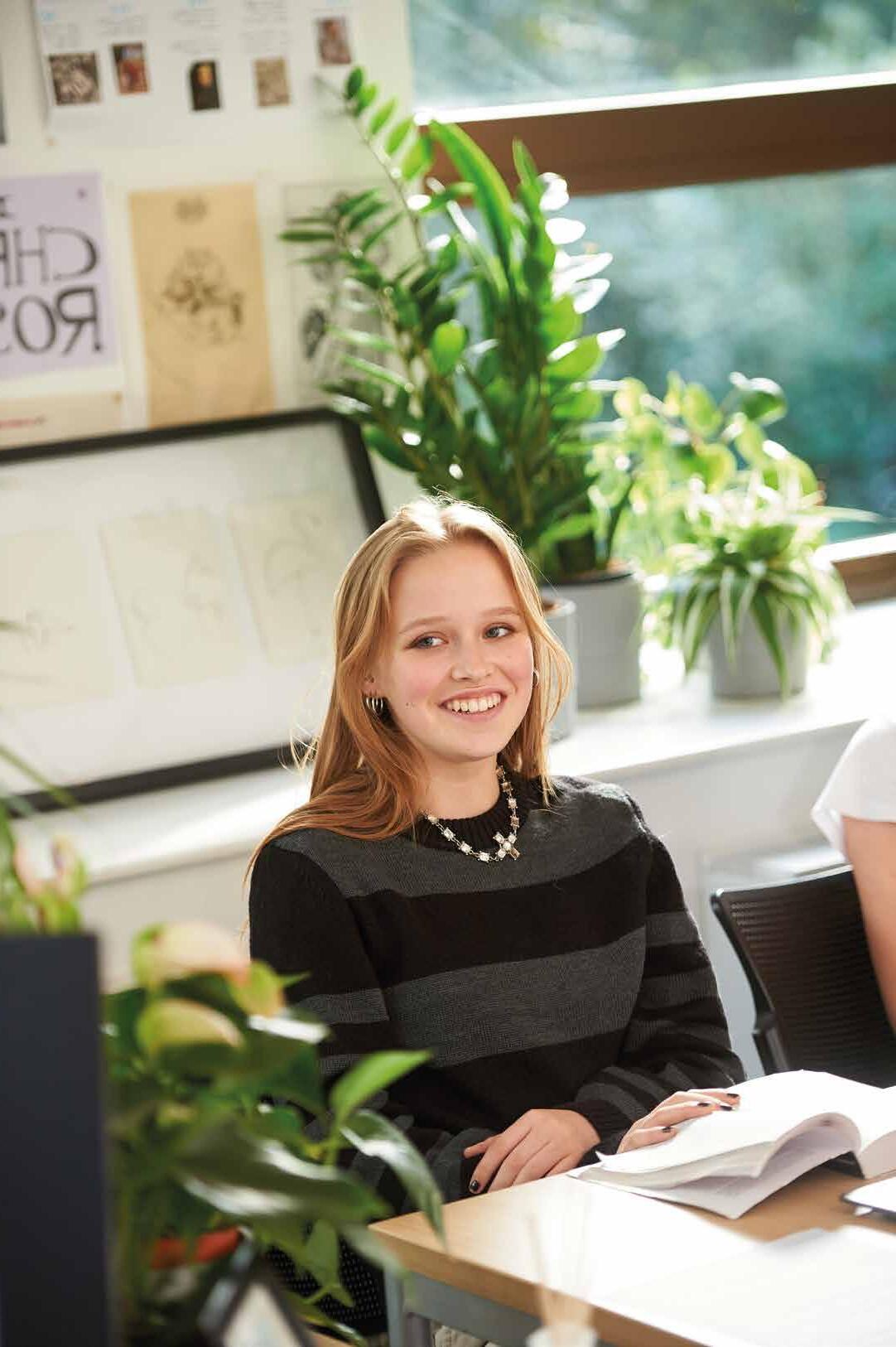
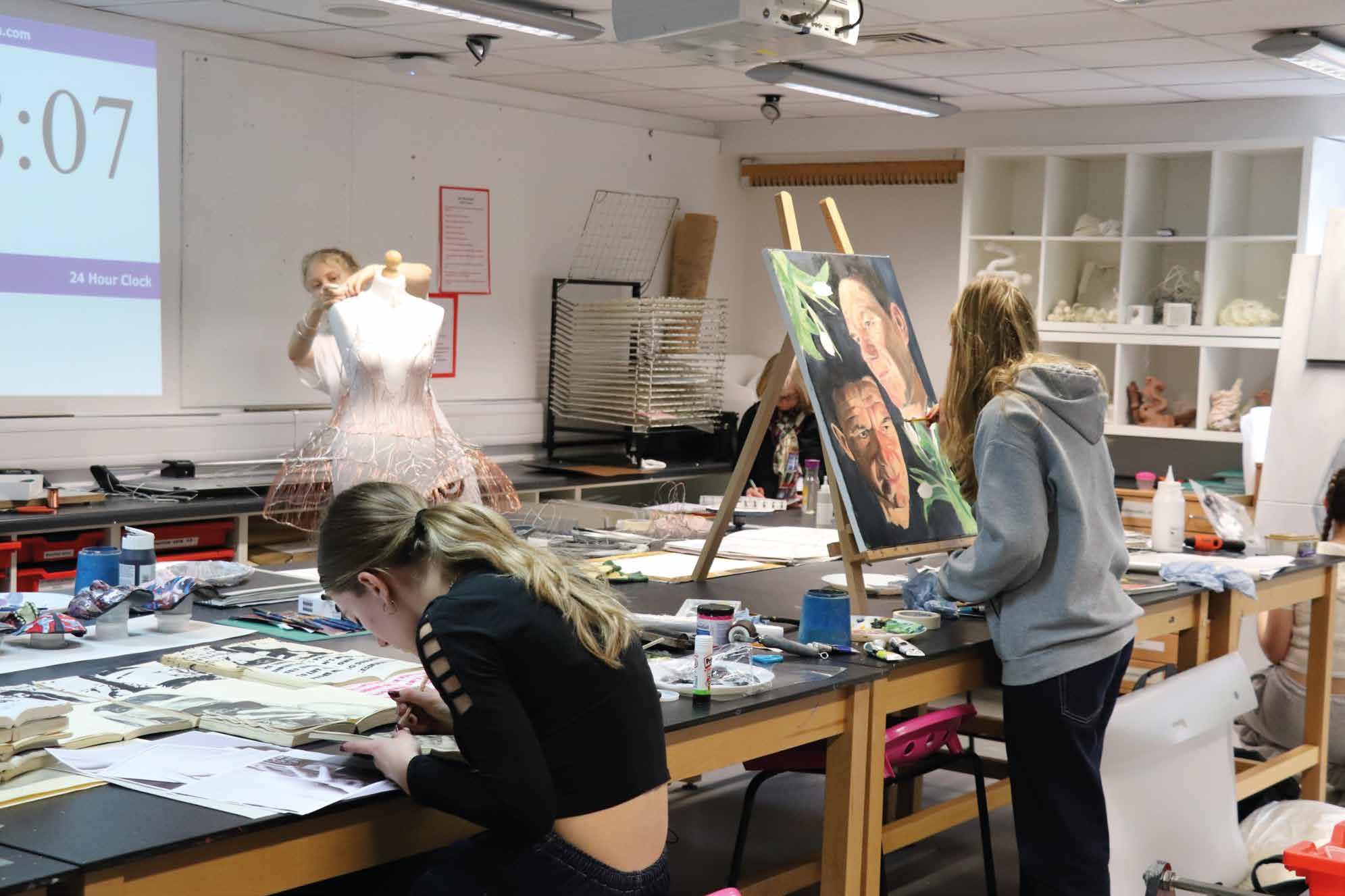
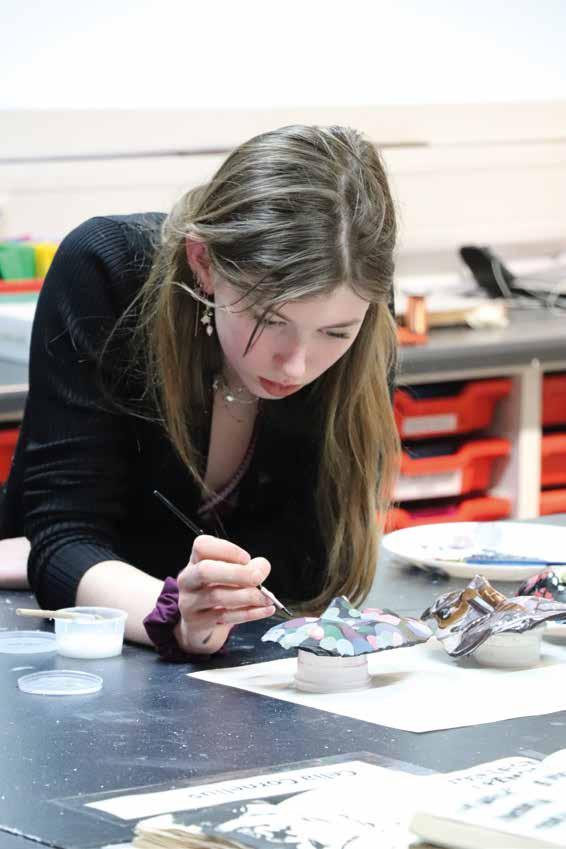
A Level Art students should have:
A passion for the subject with evidence of prior GCSE practical work of a high standard (at least a grade 8 at GCSE).
A willingness to focus on experimenting and refining skills using different processes and techniques and a desire to draw skilfully from observation.
An aptitude for creativity and focus to develop ideas convincingly and imaginatively and to embrace risk-taking outside their comfort zone.
A sense of purpose to explore and develop work independently.
A commitment to broadening art knowledge through visits to galleries and places of cultural interest.
Students are introduced to a Foundation in Art and Design through a range of workshops exploring and developing their skills in different fine art media, techniques, and processes. They learn to work in different ways, experimenting with drawing, painting, printmaking, sculpture, photography and digital art which are contextualised with research into the Turner Prize and relevant artists, making links to their own and other artists’ intentions. Students plan work independently for at least five additional hours in the Taylor Art Studio each week. Students develop their own chosen in-depth ‘Personal Investigation’ (Component 1, worth 60%) with final outcomes relevant to the theme. Alongside this practical work, students produce an extended written element of contextual
analysis (1000 words minimum) in which they examine and document their own personal practice. Both practical and written elements are submitted by January of Year 13. The Externally Set Assignment (Component 2, worth 40%) starts in February and is completed by May. Ideally, A Level Art students will be committed to building up substantial evidence of exploration in a range of processes and techniques. This inquisitive and risk-taking element will be vital to their continued progress and creative journey to success.
Year 12 Foundation workshops, journals, life-drawing, sketchbooks, and personal responses are not assessed. However, relevant work may be selected for Foundation portfolio applications in Year 13.
In Year 12 (Spring term) and into Year 13, students focus on developing a sustained and in-depth Personal Investigation, with sketchbooks, other media, and responses to include an integrated 1000 word written element (60%). The Externally Set Assignment (40%) is set in February with a choice of questions for students. They are expected to produce a body of highly developed, relevant work and final responses which emulate the journey they have already made in their Personal Investigation.
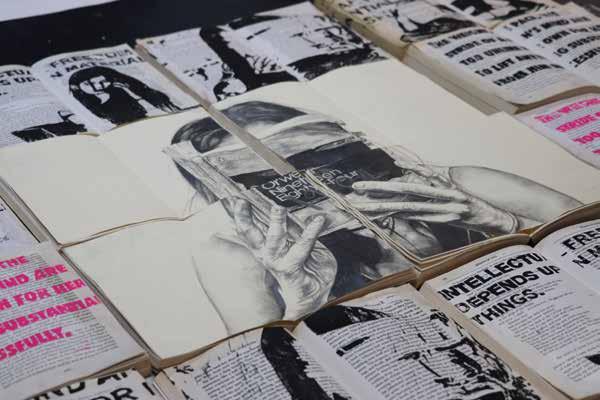
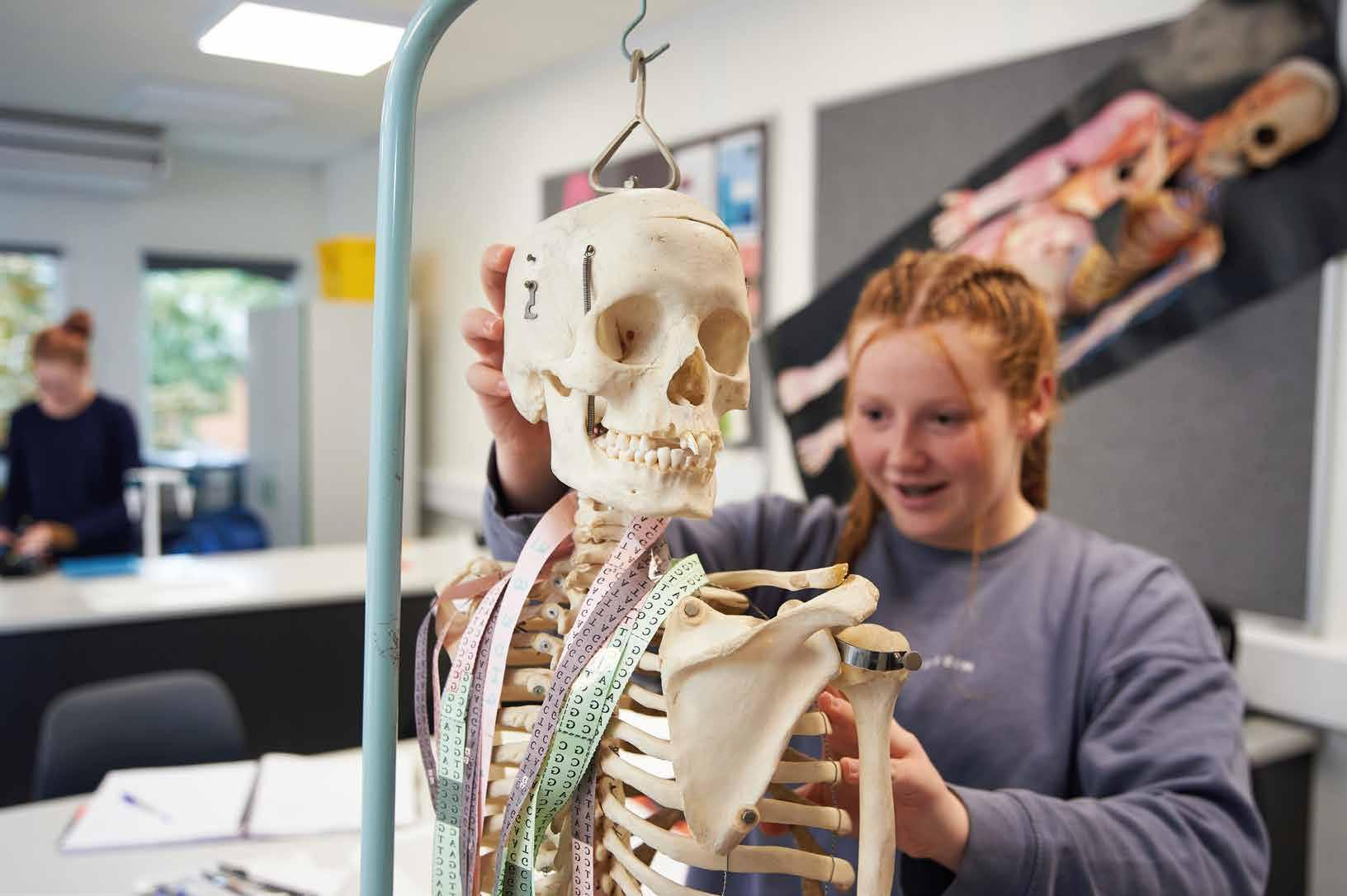
The course aims to sustain and develop an enjoyment of, and interest in, living organisms. It will promote an awareness and appreciation of Biology in personal, social, environmental, economic and technological contexts and promote the responsible use of Biology in society. Careers leading directly from A Level Biology include: Medicine, Physiotherapy and other paramedical careers, Veterinary Science, Animal Welfare and Breeding, Agriculture and Genetics. It is also an important basis for degree courses in Environmental Science, Biochemistry, Psychology, Biotechnology, Food Science and Nutrition. It provides an excellent background for many other careers as biologists are skilled in written communication, collecting data, statistical analysis and tackling complex problems.
An enquiring mind and a fascination with the living world around you.
An interest in living organisms and how they are adapted to their environments.
An interest in chemistry and an understanding of the importance of biochemistry in modern biology.
It is vital that you have achieved at least a grade 8 in GCSE Biology.
The OCR A Level in Biology A (H420) consists of six modules, taught over two years. The first four modules are taught in Year 12 before modules 5 and 6 are completed in Year 13.
Module 1 is focused on the practical skills required for investigating biological systems and is embedded throughout modules 2 to 5.
Module 2 takes a microscopic view of life, investigating the biochemistry and the organisation of cells.
Module 3 explores how organisms obtain and transport the materials essential for life.
Module 4 studies the diversity of life on Earth, the effects of evolution through natural selection, and our own body’s defence against disease as a case study of adaptation.
Module 5 investigates the systems and processes by which multicellular organisms maintain homeostasis, and how the processes of photosynthesis and respiration drive life on Earth.
Module 6 provides a holistic overview of living systems from the level of the gene to the study of population dynamics.
The OCR A Level Biology course requires a proactive approach to problem solving and an ability to apply knowledge, understanding and practical expertise to novel scenarios.
The course content will be assessed through three written examinations taken at the end of Year 13.
Paper 1 Biological Processes (Modules 1,2,3 and 5) 37%
Paper 2 Biological Diversity (Modules 1,2,4 and 6) 37%
Paper 3 Unified Biology (Modules 1 to 6) 26%
Practical skills will be assessed internally by teachers, with satisfactory completion resulting in the achievement of the Practical Endorsement from the OCR examination board.
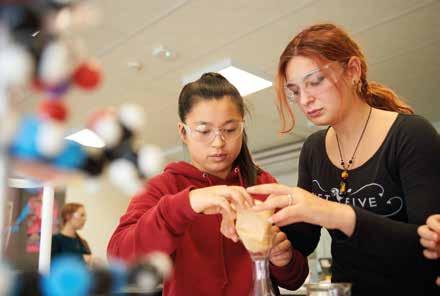
The pace of change in the world of work creates a need for workers of the future to be adaptable and flexible. ‘85 per cent of the jobs that will exist in 2030 haven’t even been invented yet’* and this A Level Business course, with its blend of quantitative and qualitative aspects delivered through real world case studies, will give you the basic ‘toolkit’ and fundamentals for life in business in its widest sense. Students will investigate firms such as Zara, Next, Cadbury and Pret a Manger and will appraise their competitive positions in terms of finance, marketing, operations and

human resources, along with the external competitive environment nationally and globally.
The Edexcel A Level in Business comprises four core themes: marketing and people (HR); managing business activities (finance and the impact of external influences); business decisions and strategy, and globalised business. A pre-released context in the autumn outlines the content for the third examination paper. Themes in recent years have included the international sports events industry and the UK fashion industry.
It is anticipated that Themes 1 and 2 will be studied in Year 12 and Themes 3 and 4 in Year 13.
Theme 1 Marketing and People (the Marketing Mix; Human Resource Management; Entrepreneurs and Leaders)
Theme 2 Managing Business Activities (raising and managing finance; the effect of external influences and PESTLE analysis)
Theme 3 Business decisions and strategy (objectives and strategy; quantitative decision-making; competitiveness and change)
Theme 4 Global Business (globalised markets and marketing; multinational corporations)
All assessment is through examination and is data response with extended open response (essay).
Paper 1 Marketing, People and Global Business (two hours, exams Themes 1 and 4)
Paper 2 Business Activities, Decisions and Strategy (two hours, exams Themes 2 and 3)
Paper 3 Investigating Business in a Competitive Environment (two hours, pre-released context, synoptic)
*The Institute for the Future (ITFT) Report The Next Era of Human Partnerships p14 (2017)
It is expected that candidates achieve a minimum of a grade 7 in Mathematics GCSE and grade 8 in GCSE Business if taken.
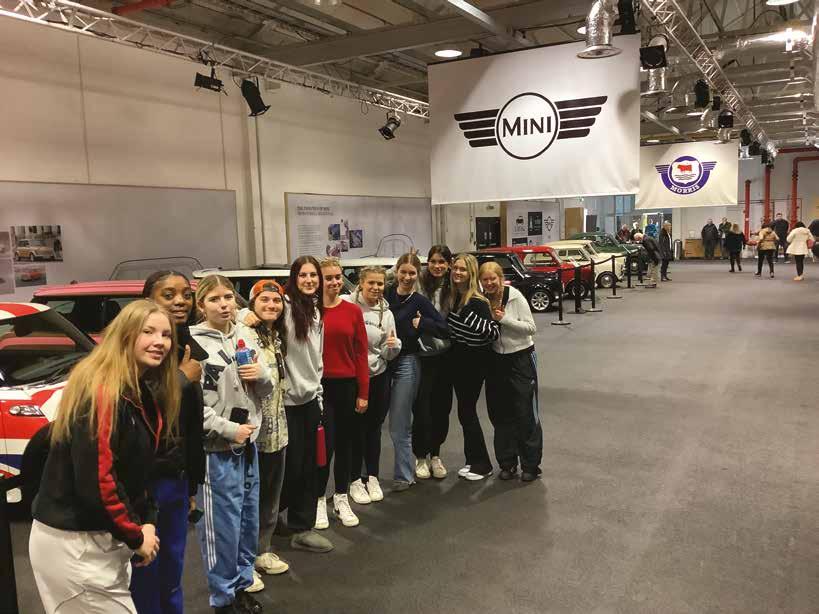
OCR H432
Chemistry isn't just a subject – it's the way to understand the universe at its most fundamental level. As you dive into the world of molecules, reactions, and transformations, you'll sharpen your logical thinking and refine your ability to articulate complex ideas with precision. More than that, Chemistry reveals the invisible forces that shape our modern world, from life-saving pharmaceuticals to groundbreaking materials, from tackling climate change to revolutionising food production.
With Chemistry, you'll be equipped to decode major global challenges like environmental protection and sustainable energy. Your hands-on experiments and problem-solving skills will make you “scientifically literate”, a trait that stands out in any career path. If you’re dreaming of Medicine, Dentistry, or Veterinary Science, Chemistry is essential, but if you are looking elsewhere the A Level Chemistry is highly regarded by universities and employers alike.
This isn’t just learning – it’s unlocking the secrets of existence. You just need to be ready to explore.
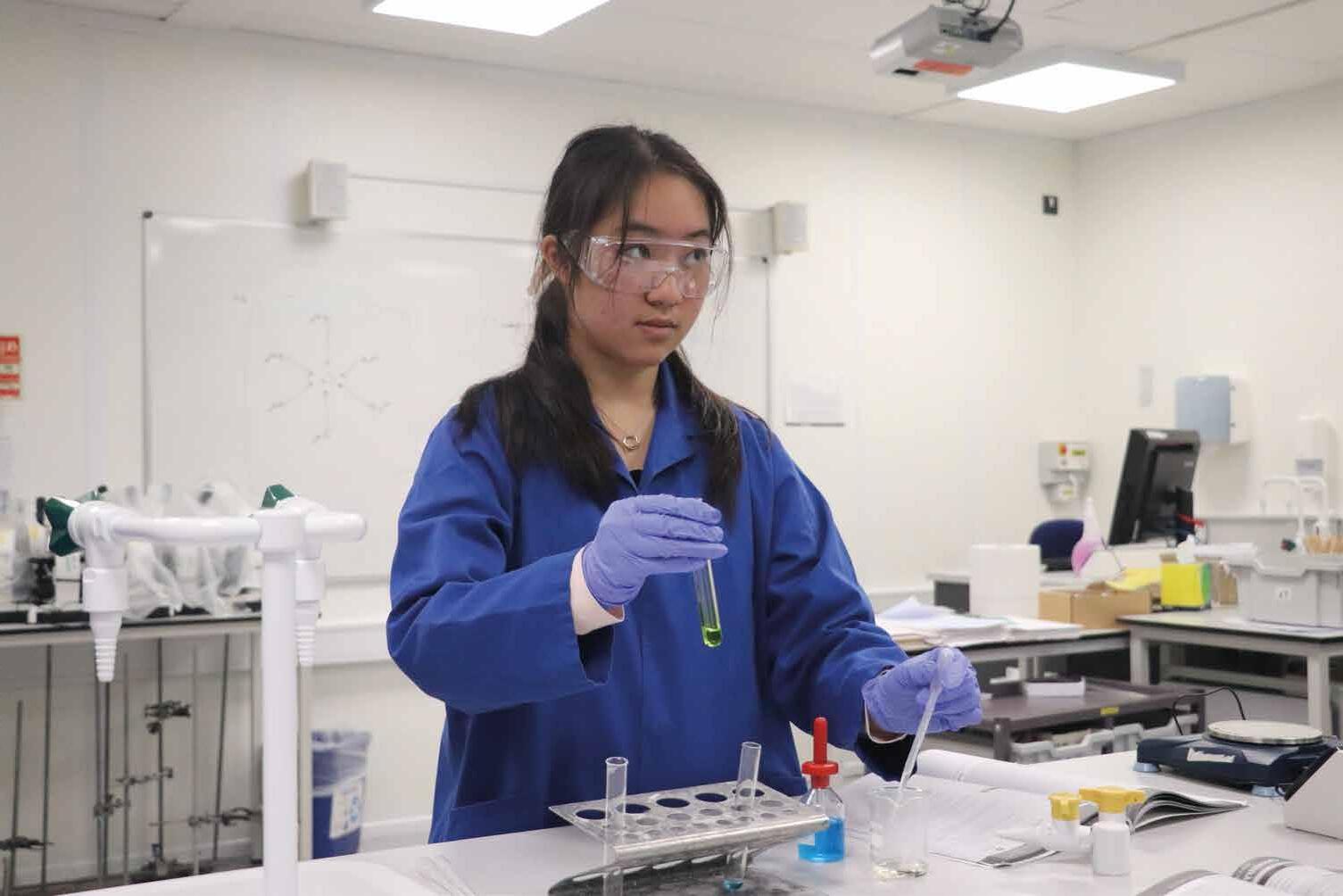

An enquiring mind and an interest in problem-solving.
A passion for practical work.
Competence in Mathematics. At least a grade 8 in GCSE Chemistry (or an equivalent grade in the Chemistry component of the Science & Additional Science GCSE).
We study the OCR A Level course, consisting of six modules. The A Level requires a more mature approach to tasks and the ability to apply knowledge and understanding, to work independently or as a group, be self-directing and self-analytical in your studies and a range of other transferable skills that will be developed and refined throughout the course.
Module 2 Atoms, compounds, molecules and equations
Module 3 Periodic table and energy
Module 4 Core organic chemistry
Module 5 Physical chemistry and transition elements
Module 6 Organic chemistry and analysis
The course content will be assessed through three written examinations taken at the end of Year 13.
Paper 1 Periodic table, elements and physical change (Modules 1,2,3 and 5) 37%
Paper 2 Synthesis and analytical techniques (Modules 1,2,4 and 6) 37%
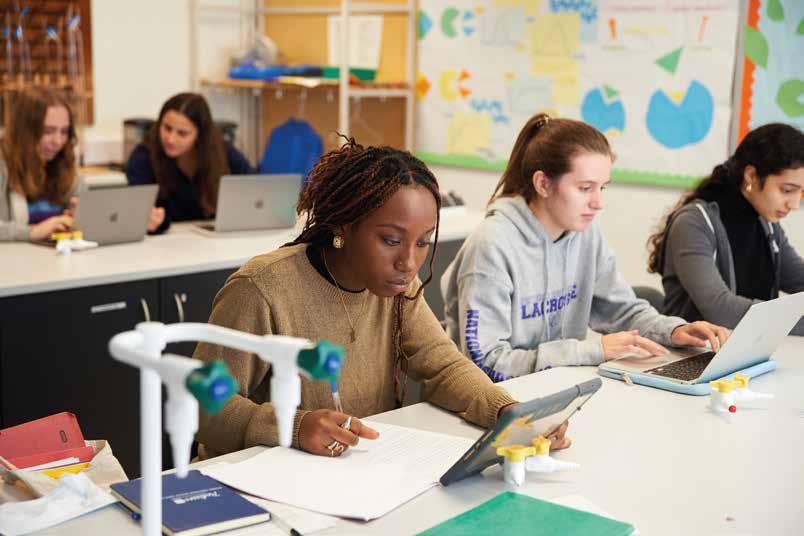
The study of Classical Civilisation offers an insight into two of the great cultures on which European civilisation is founded. It is the perfect complement to the study of English, Art or History but students often choose it as a counterpoint to their study of Sciences or Maths.
A GCSE in Classical Civilisation is not essential. Many students begin the subject at A Level and succeed in gaining high grades, even continuing their classical studies at university. All texts are studied in translation and no prior knowledge of Greek or Latin is required.
The course consists of three modules taught across both years. The core module, World of The Hero, explores the role of epic poetry in Greek and Roman society for which students will read Homer’s Iliad and Virgil’s Aeneid. The second module, Greek Theatre, examines the role of tragedy and comedy in Athenian society. Students will read Euripides’ Bacchae, Sophocles’ Oedipus Rex, and Aristophanes’ Frogs while studying the cultural and political context in which these plays were written.
The final module, Love and Relationships, examines Greek and Roman attitudes towards
OCR H408

broader social and cultural context, students will read Plato’s Symposium, Ovid’s Ars Amatoria, and selected works by Sappho and Seneca.
All assessment is via written examinations at the end of Year 13.
SUMMER COURSES AND THE GDST PEARSON AND SILVER AWARD
Each year pupils studying classical subjects at Putney attend a range of summer schools in classical history, civilisation, and language. The GDST Pearson & Silver Awards offer financial support with the cost of attending these courses to pupils in Years 12 and 13. Applications are opened in February of each year and interested students should ask
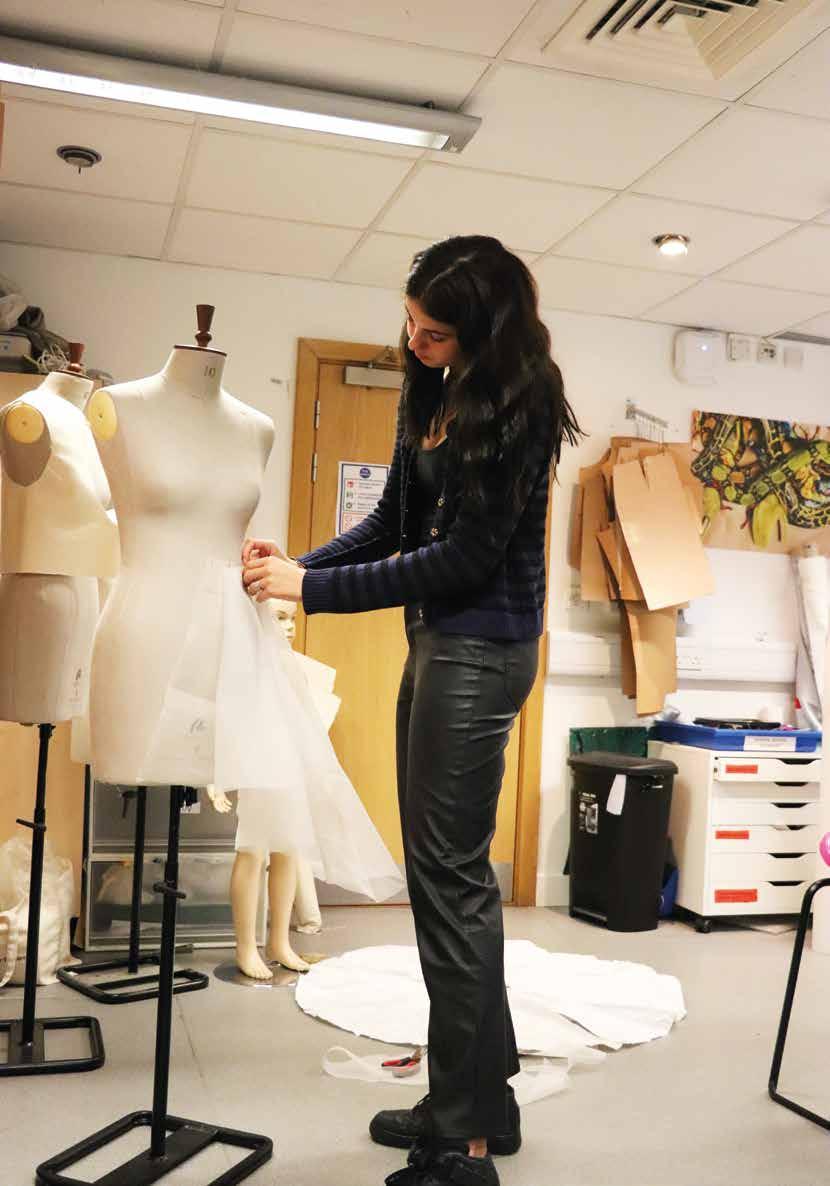
A grade 8 in GCSE Greek is a pre-requisite for the A Level. Interested Sixth Form students who do not have the GCSE may study for it outside the timetable as an alternative to the A Level.
In Year 12, we focus on language work and students revise all grammar from GCSE before expanding their knowledge of vocabulary, accidence and syntax. The language papers taken in Year 13 examine unseen translation skills and either a comprehension exercise or prose composition (translation into Greek). A significant advance from GCSE will be the addition of unseen verse translation from Greek tragedy and students will translate passages from Aeschylus, Sophocles, and Euripides.
As at GCSE, the study of prose and verse literature comprises 50% of the examined material. Students will study the original work of authors such as Homer, Aristophanes, Thucydides, and Plato across both years of the course.
This course is traditionally taken by students with a strong interest in the classical world as well as those with a passion for languages and linguistics. As most traditional academic and medical vocabulary is drawn from Greek, it is a very strong companion for the sciences as well as the humanities.
All assessment is through written examinations at the end of Year 13.
Each year pupils studying classical subjects at Putney attend a range of summer schools in classical history, civilisation, and language. The GDST Pearson & Silver Awards offer financial support with the cost of attending
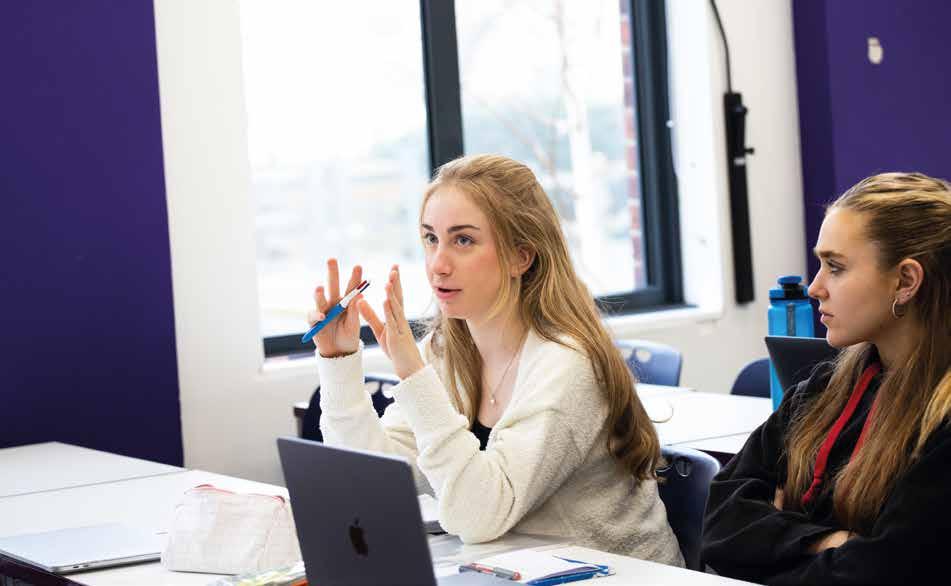
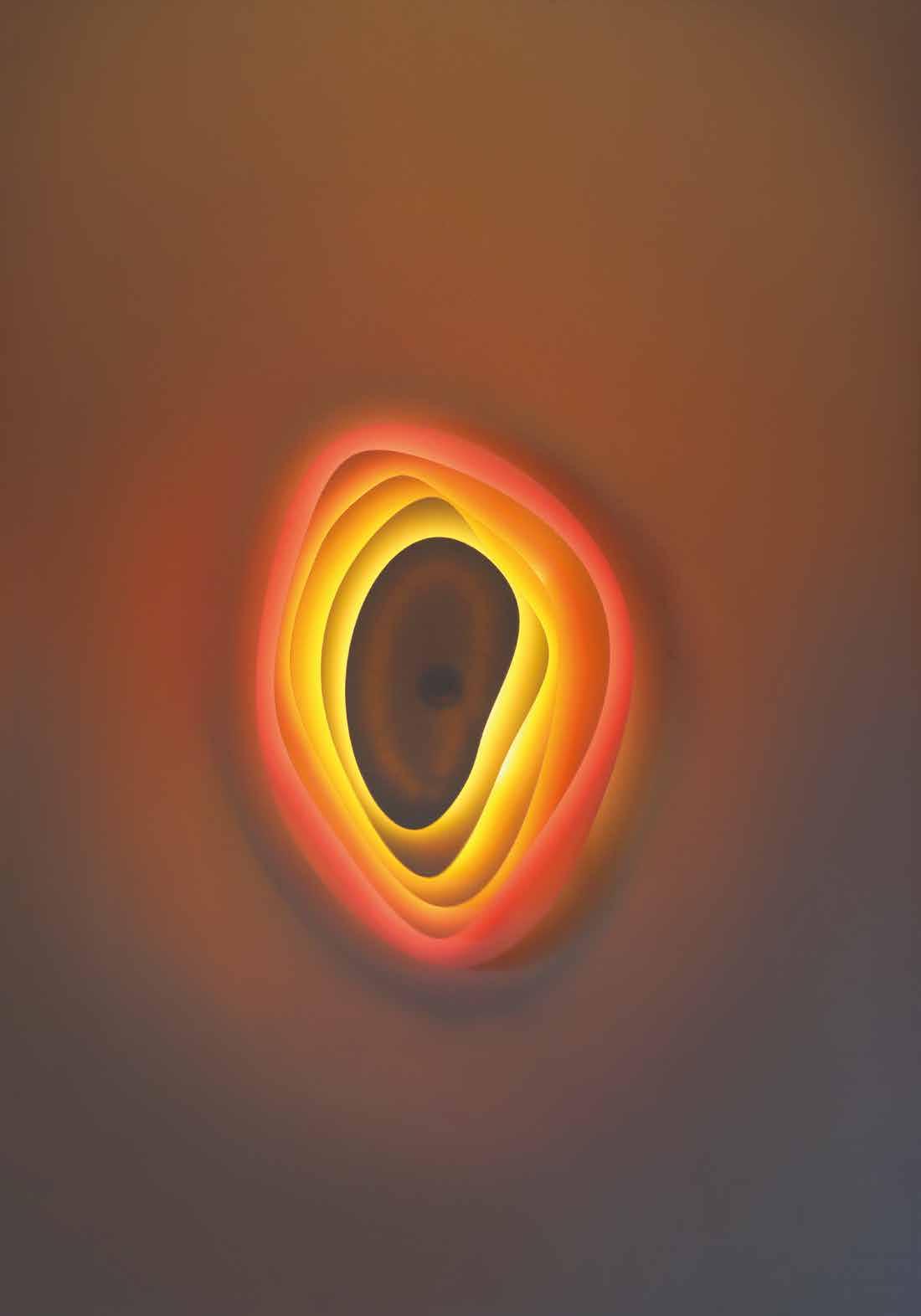
Computer Science A Level equips pupils with the technical skills to develop and design programs, build apps and integrate these into creative solutions in all fields of business and industry.
This subject is suitable for those who are


Pupils who choose Computer Science undertake a varied course which is broadly split into a theoretical foundation of how computers operate, and programming. There are also elements of ethical and legal aspects of computing.
Students utilise learnt theory and programming skills to approach their own non-examined assessment projects using the Python programming language. This language is used professionally in a broad range of applications, accepted as an entry software developer language at all the largest tech firms, for use in applications, networking and infrastructure, web development and games.
The written part of the course allows pupils to understand how information is represented in computers, common algorithms and data structures, hardware and networks, and software development.
Students undertake their practical programming project (usually focused on entrepreneurial, problem-solving or commercial applications). This work forms the basis of future portfolios and further develops programming and critical thinking skills.
All assessment is during and at the end of Year 13, with two exam papers and a programming project.
Practical programming project 20%
Paper 1 Computer systems 40%
Paper 2 Algorithms and programming 40%
WILL I NEED TO STUDY COMPUTER SCIENCE?
GCSE Computer Science is not a prerequisite for A Level. There are no GCSE grade requirements for the course, but it will be of benefit to have a strong interest in technology, and a hands-on understanding of writing simple computer programs.

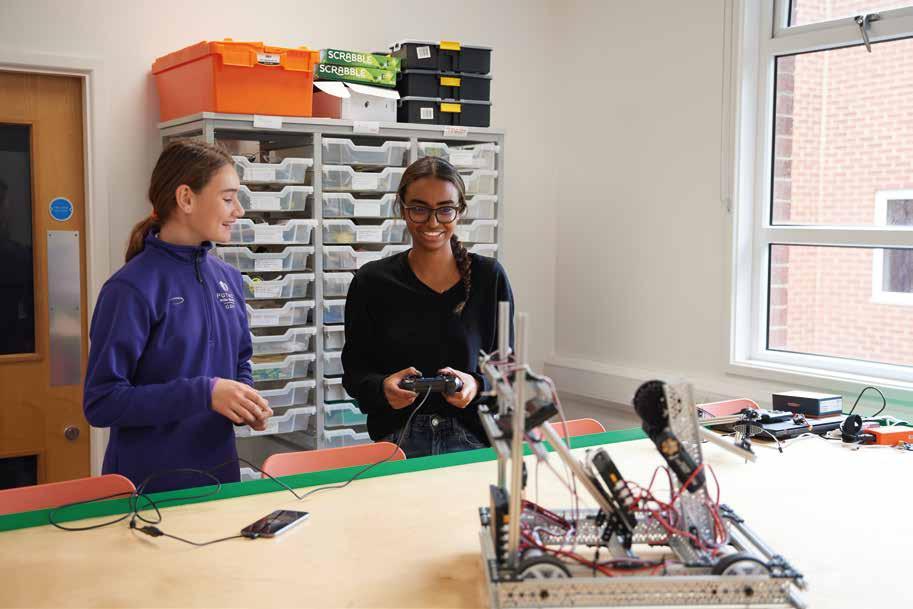

The world of fashion is a trillion-pound industry that employs over 800,000 people in the UK. Whilst the course will naturally appeal to those wishing to pursue a career in the creative industries, Fashion and Textiles is linked to the world of design, manufacturing, business and marketing and successfully complements and contrasts with a wide range of A Level subjects. The course includes the study of consumer trends, textile products and materials, construction processes and surface decoration techniques, as well as wider issues in the industry. You will combine creative and technological principles to create a marketable and innovative garment.
DT:
Students are generally expected to achieve a minimum GCSE: Design Technology – Textiles or GCSE Art grade 8. As a Textiles student you should have an interest in the development of a product from the materials used, to its form and function. You should be able to generate and communicate ideas in a range of media and be prepared to apply your creative and problem-solving skills independently.
The AQA Fashion & Textiles course comprises the two elements outlined below. Over the two years, you will participate in lessons involving practical activities, theory tasks and design tutorials to prepare for:
The NEA Design Project requires learners to undertake a substantial design and make and evaluate a project centred on the iterative processes of ‘explore, create and evaluate’. There is an emphasis on creativity and technical application in the creation of a design portfolio and outcome. Students compose a Fashion Design Brief from a context of their own choice, and create a portfolio of evidence and a high quality product to demonstrate their competence.
Theory: Technical Principles This includes technical knowledge and understanding of materials. Students will also consider globalisation, core design principles, environmental concerns and inclusive design.
Theory: Design and Making Principles Focuses on topics such as history of fashion, the study of designers and their work, as well as the analysis of existing products in terms of suitability and material choice.
NEA Design Project 50%
Written paper Technical Principles: 30%
Written paper Designing and Making Principles: 20%



Product Design is at the heart of STEAM and at the forefront of technological advancement. Students combine creative and scientific principles to create a marketable and innovative product. The subject is closely related to industrial and commercial standards providing transferable skills for the future: ICT, organisational, analytical and evaluative. It includes the study of contemporary design issues, the life cycle of a product, engineering methods, resistant materials and electronics. The Product Design course at Putney is an excellent choice for students interested in applying to read Engineering, Architecture, Materials Science, or any allied design field. It also successfully complements a wide range of other A Level studies.


DT:
Students are generally expected to achieve a minimum Design Technology GCSE grade 8. You should have an interest in the development of a product from the materials used, to form and function. You should be able to generate creative solutions using different types of media and apply problem-solving and practical skills independently. Students should actively seek out challenge and expand their design comprehension by visiting museums, exhibitions and events.
A Level Design and Technology: Product Design requires students to engage in both practical and theoretical study. This specification requires students to cover design and technology skills and knowledge as set out below. These have been separated into:
Technical principles
Designing and making principles
Students should develop the ability to draw on and apply a range of skills and knowledge from other subject areas to inform their decisions in design and the application or development of technology. There are clear links between aspects of the specification content and other subject areas such as Computer Science, Business Studies, Art and Design and History.
Paper 1 Technical Principles: Written Exam, 2 hours and 30 minutes, 120 marks, 30%
Paper 2 Designing and Making Principles: Written Exam: 1 hour and 30 minutes: 80 marks: 20%
Non-exam assessment (NEA): Substantial design and make project: 100 marks: 50%
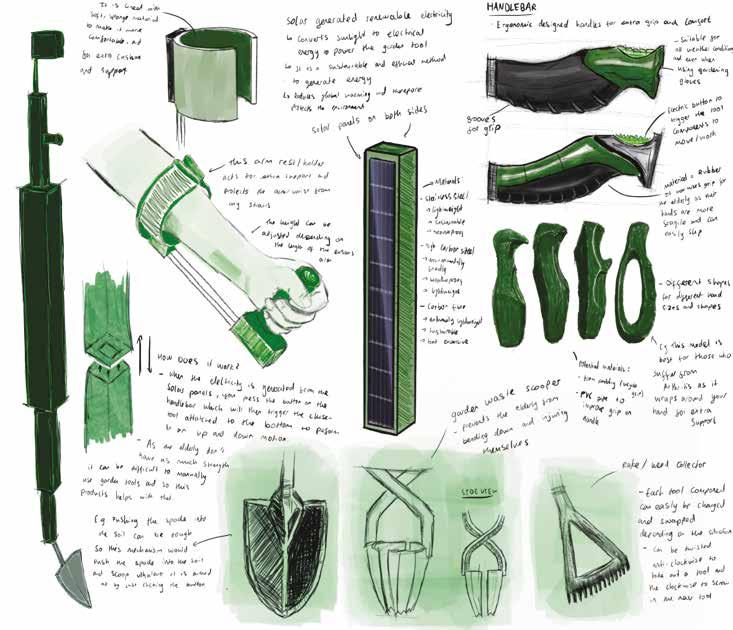

Because you love theatre in its infinite variety! Students become actively engaged in the following activities to varying degrees: acting, devising and writing plays, frequent visits to the theatre; stage, set and costume design, lighting and sound. Drama and Theatre is recognised by all the major universities as a richly varied and valuable subject, especially with its emphasis on collaborative, presentational and confidence boosting skills, which are becoming increasingly essential in today’s workplace. It is probably the only subject where you have to work in groups, take risks, be creative and produce meaningful, vibrant, and dynamic work.
EDEXCEL 9DR0
GCSE Drama is useful but not essential. What is invaluable is some knowledge and experience of acting in plays, and/or drama clubs/classes, which could be both in or outside of school.
Component 1 Devising an original piece of performance based on a play and the theatre practitioner Brecht. This component is started in Year 12.
Component 2 Text in Performance.
Performing a monologue or duologue and a group piece – this component would be completed in Year 13.
Component 3 Theatre Makers in Practice. This examination consists of three sections and explores response to live theatre performances, studying the plays Machinal by Sophie Treadwell and The Tempest by William Shakespeare, as well as the methodology of the theatre practitioners Punchdrunk. Each section asks students to approach the paper as a theatre practitioner, a performer, a director and a designer.
METHOD OF ASSESSMENT: NON-EXAMINATION ASSESSMENT (NEA)
Component 1 40%
A written portfolio of the development of the practical devised performance (2500-3000 words) and the performance of the piece – all internally marked and externally moderated. The written element is 60 marks, and the practical performance 20 marks.
Component 2 20%
Externally assessed by a visiting examiner –monologue or duologue is worth 24 marks and group piece 36 marks.
Component 3 40%
Evaluation of Live Theatre is 20 marks, with the students being allowed to have 500 words of notes with them. Page to Stage is 36 marks, where students will be given a section of the text they have studied and write about how they will create a performance of the scene. Interpreting a Performance Text is 24 marks and will ask the students to answer a question in terms of re-imagining a concept that they have for a play to make it meaningful to a contemporary audience.

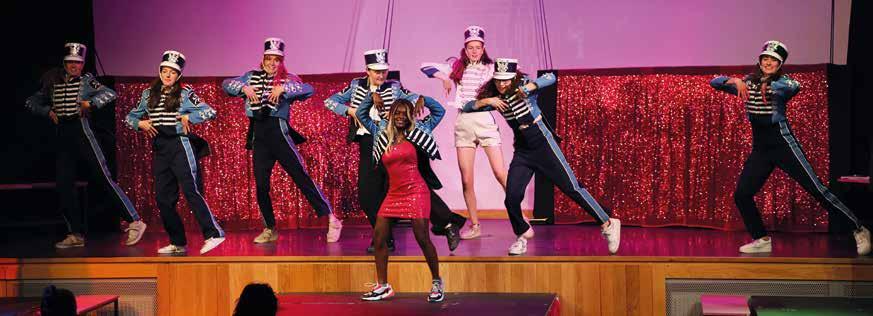

EDEXCEL 9EC0
Economics is a social science which relates to the consequences of decision-making in everyday life. It has close links to many subjects – History, Geography, Mathematics, Politics, Psychology, Law, Philosophy and others. Its topicality makes it relevant to all who wish to study how and why economic systems function as they do.
The course is based around four themes which comprise the microeconomic environment (individuals’ decisions and firms’ behaviour), and macroeconomics (UK and the global economy). You will explore many issues in the world around you such as market competition, prices, government policy, the welfare state, international trade, economic development, sustainability and much more. Recent changes to content mean that financial markets are covered; some basic economic history is included, and elements of behavioural economics are investigated.
As there are few areas in our lives in which economics does not appear in some form, the lessons often involve lively argument and debate surrounding current topical issues.




This linear two-year Edexcel course comprises four themes, two of which are microeconomic and two macroeconomic.
Theme 1 Introduction to markets and market failure (micro)
Theme 2 The UK economy performance and policies (macro)
Theme 3 Business behaviour and the labour market (micro)
Theme 4 A global perspective (macro)

All assessment is through written examinations. Questions include supported choice, data response and essays. There is no coursework. Assessment comprises three 2-hour examinations at the end of the two-year course:
Paper 1 Markets and business behaviour (examines themes 1 and 3)
Paper 2 The national and global economy (examines themes 2 and 4)
Paper 3 Microeconomics and macroeconomics (synoptic: examines all themes)
It is expected that candidates achieve a grade 8 or above in GCSE Mathematics and have an ability to write well.
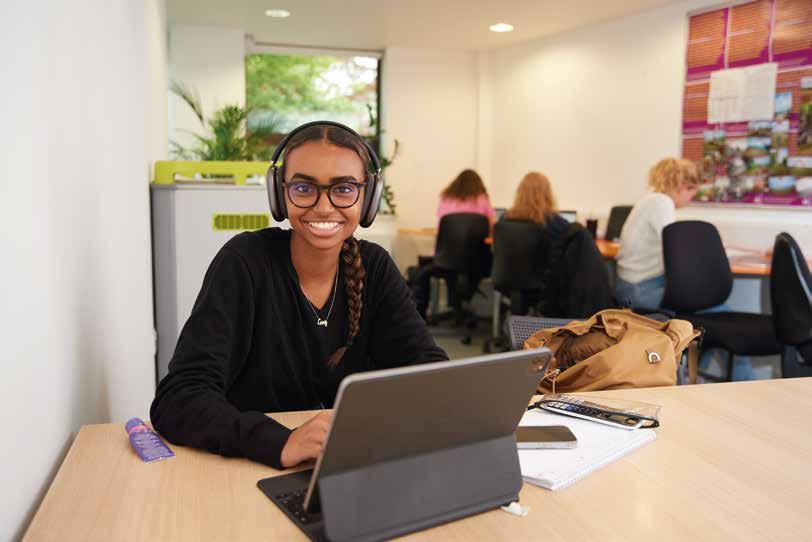
Economics has relevance in all areas of society. An interest in and an awareness of current affairs is useful.
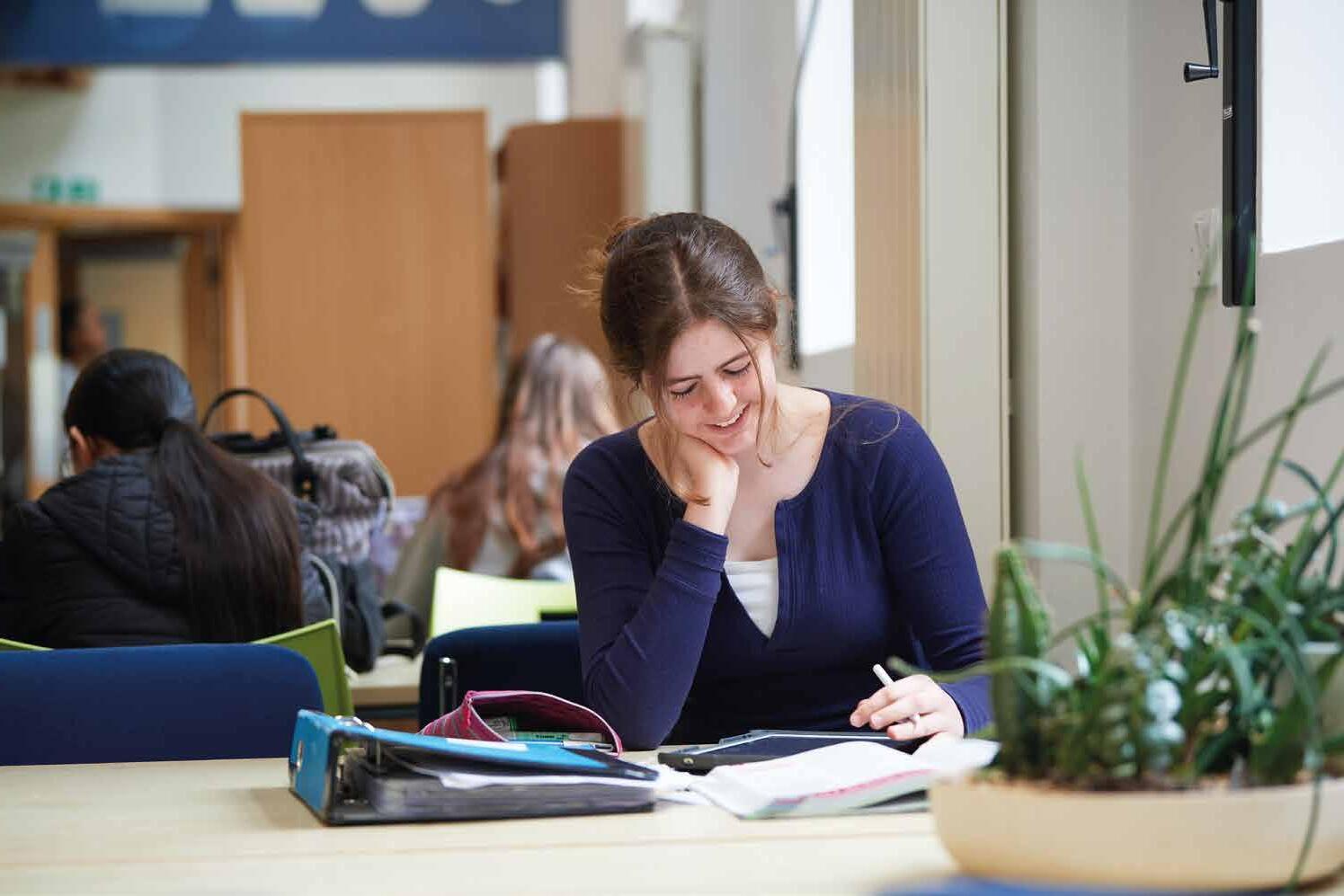
In addition to providing considerable pleasure, studying a range of literature will broaden your ideas, develop the skills involved in debate and discussion, and encourage the discipline of detailed textual analysis – it will stretch your mind! It is a highly regarded, useful foundation for a range of university subjects.
EDEXCEL 9ET0
You need to love literature to do well in this subject but the ‘love’ without hard work is not enough for those wishing to excel in the examinations. You will need to demonstrate the ability to write clearly using appropriate literary terms, arguing fluently and analysing cogently. Grade 8 or 9 in GCSE English
The qualification requires students to study eight texts. At least three must be pre-1900 (including at least one Shakespeare play) and at least one must be post-2000. For A Level there are three examination components (80%) and one coursework component (20%).
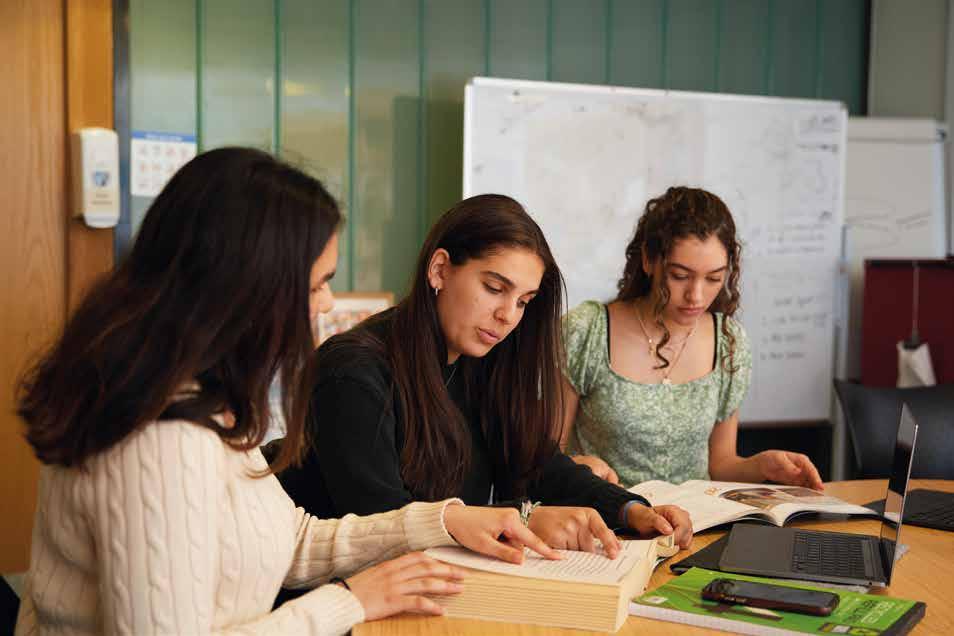
EDEXCEL
P301 & P304
An EPQ is a highly valued qualification, which allows you to explore an area of interest beyond the confines of the classroom.
The Extended Project will involve you getting to grips with independent research; you will be responsible for choosing your topic and question, as well as deciding how to best present your ideas. It is an exciting opportunity to go deeper into one of the subjects you will be studying at A Level, or to keep up with another subject that you have a particular interest in. It is also a great chance to try a
completely new subject that isn’t offered at A Level for example, Law, International Relations or Biomedical Sciences.
Many universities will lower their offer (eg AAA to AAB) if you get an A or A* in an EPQ they consider relevant. All universities value it (when mentioned on a UCAS statement) and, although Oxford and Cambridge do not yet lower their offers, they might discuss your EPQ at interview, allowing you to demonstrate your independence and passion to go beyond the curriculum. Around 90% of Putney students achieve an A* or A.

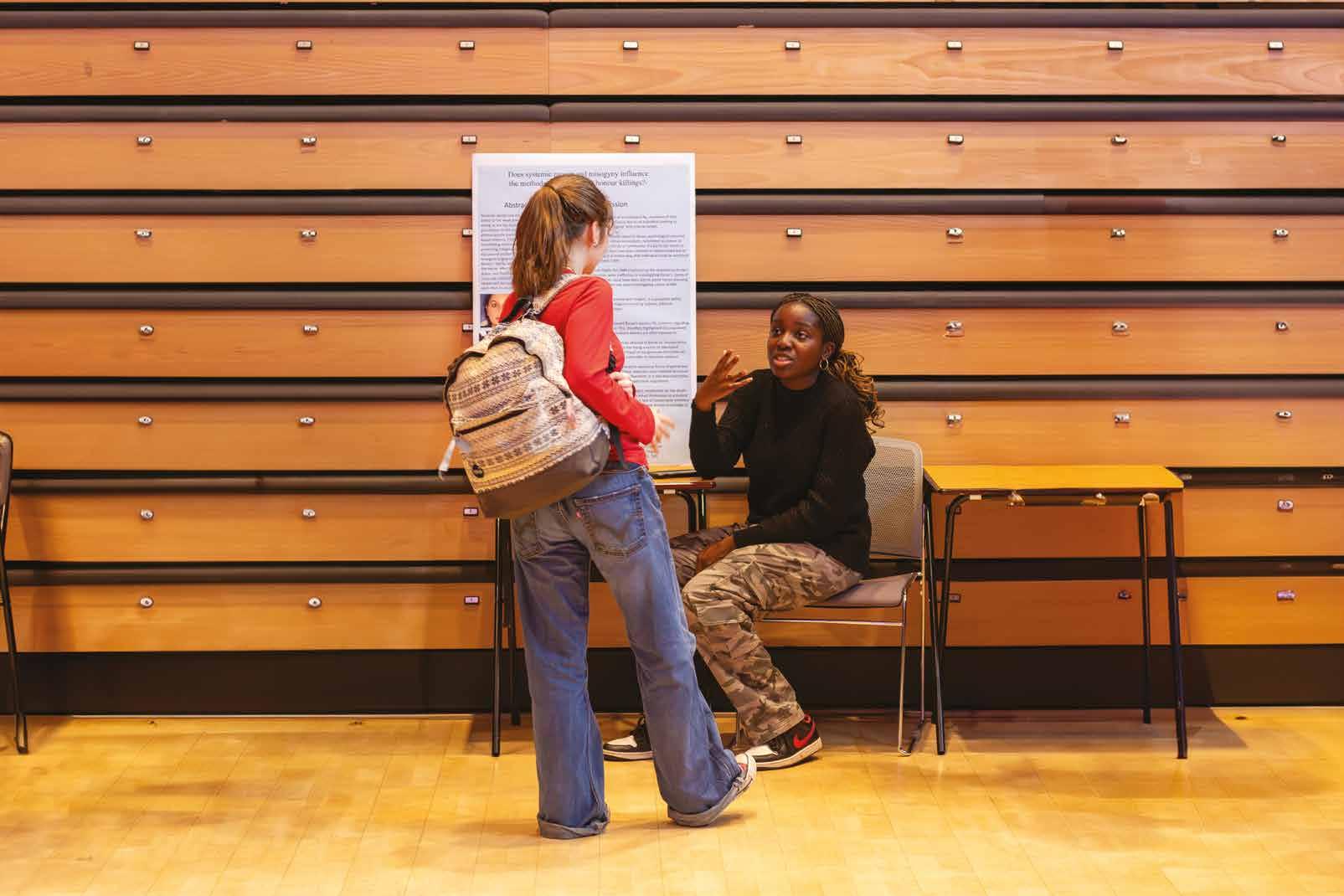
You will need to be organised and have a passion for a particular subject area. You will work independently and so will need to be able to manage your own deadlines and pursue your own research.
You will choose your topic in the Autumn term of Year 12 and start researching and developing your project. Projects will be completed by the end of Year 12.
All students are allocated a mentor who they will meet regularly to monitor progress and talk through ideas and any problem areas.
METHOD OF ASSESSMENT: NON-EXAMINATION ASSESSMENT (NEA)
There are a range of ways that you might choose to present your work. Most students will typically complete an extended essay (around 6000 words) on their chosen subject area, but there are also options to produce a performance, an artefact or a scientific investigation.
You will also have to track your progress and complete a logbook which is assessed in conjunction with the essay.
Students also produce a poster based on their findings and deliver a short presentation at the EPQ evening in Year 13.
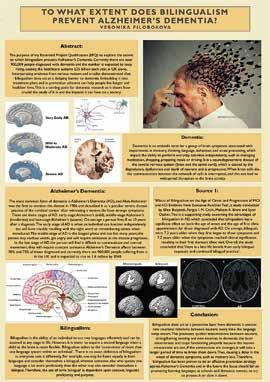

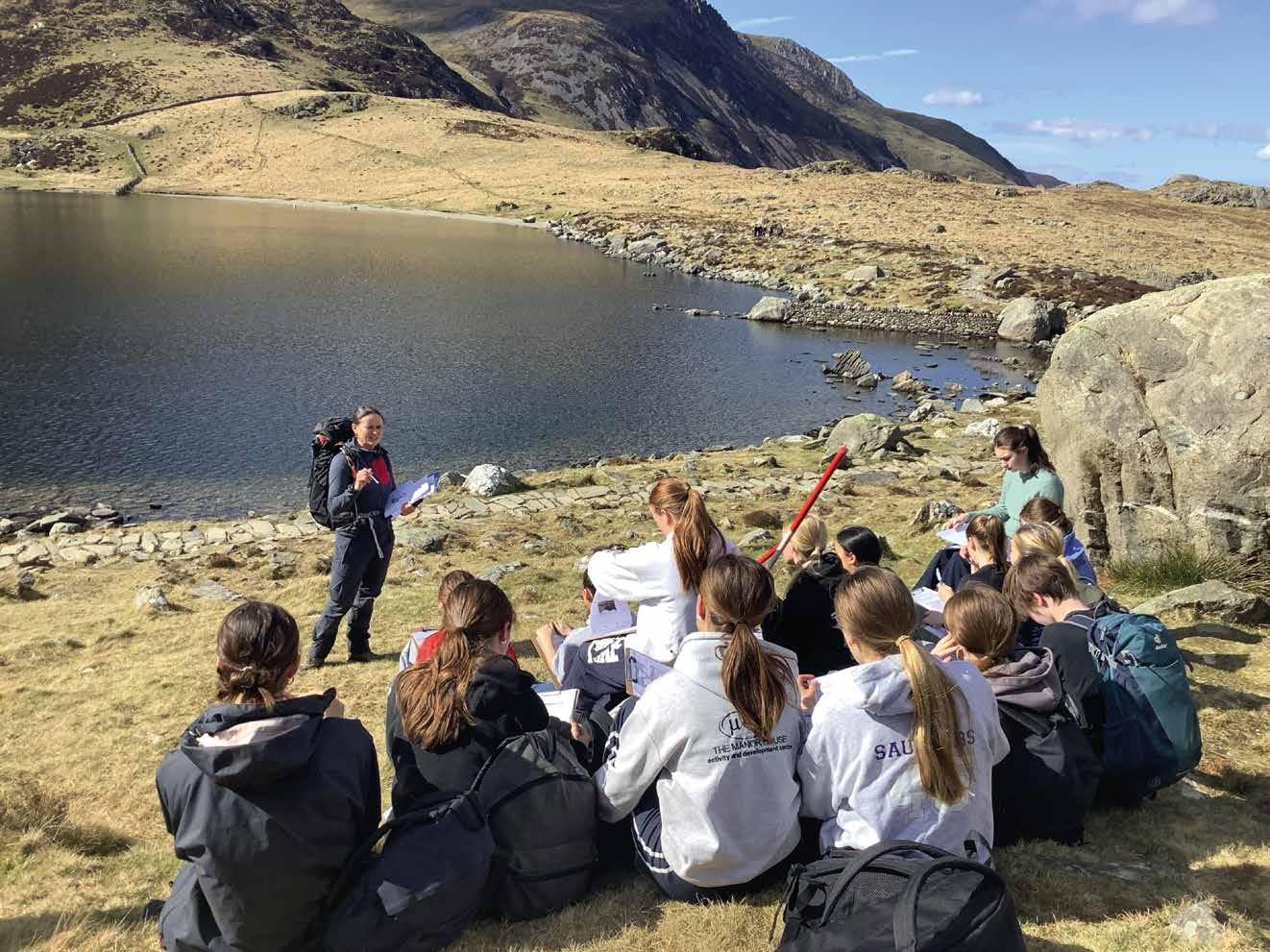
Geography is a wonderful, all-encompassing subject that is increasingly relevant in our global society. Our aim is to develop secure knowledge and understanding of the complex relationships between people and environment, ensuring consistent success in examinations for our students.
To accompany a varied programme of lessons, fieldwork is a key part of the specification. Previous destinations have included Iceland, Morocco and Snowdonia. Geography straddles the arts and sciences; it complements all areas of study and is a facilitating subject for a range of university courses and subsequent careers.
The core physical themes are Landscape Systems and Earth’s Life Support Systems. The core human themes will be Changing Spaces, Making Places and Power and Borders. In addition, we will cover optional topics of Disease Dilemmas and Oceans.
There will also be a non-examined assessment in the form of an individual investigation and report of about 3000–4000 words. Students undertake four days of fieldwork during the course which will cover both human and physical topics.
Three examinations of approximately 90–120 minutes 80%.
A non-examined assessment of 3000–4000 words 20%.
We would expect a strong grade at GCSE for entry to the A Level course, but of greater importance is a curiosity about the world around us and an enquiring mind, together with a commitment to the subject. A proactive approach to independent study is also valuable, as it is crucial to keep up with contemporary issues.
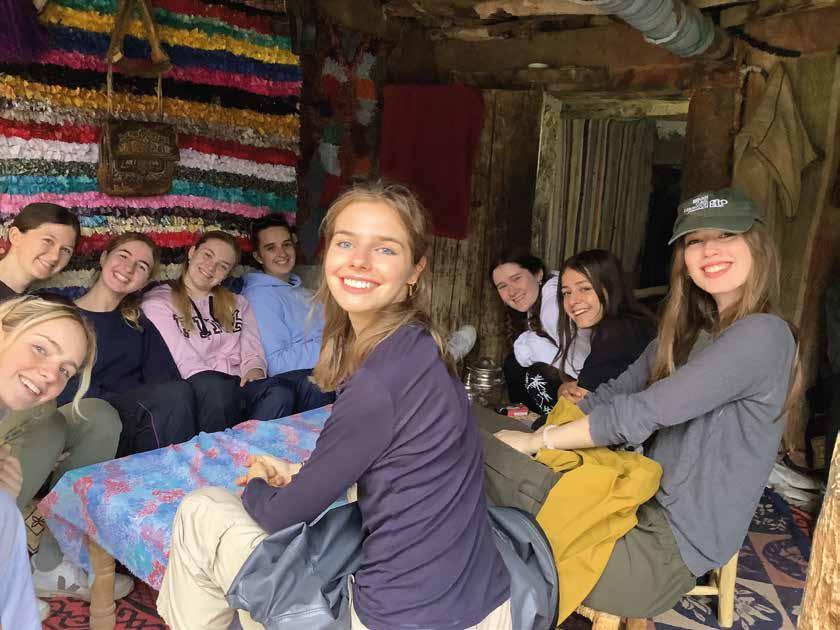

A Level History of Art is both rewarding and challenging. It allows for deep exploration and enquiry into world civilisations and allows students to develop analytical skills, constructing written arguments and enhancing their visual awareness as well as communication skills as they discuss ideas around works of art and architecture with other students and teachers.
The study of History of Art develops a wide range of skills which makes it an excellent combination with a variety of other subjects. It combines well with languages, and for science specialists offers an alternative discipline. It could lead to a career in media, publishing and marketing, or in the more specialised world of auction houses, the heritage and leisure industries, or education and arts administration in this country or overseas.
Our proximity to central London allows us to visit galleries regularly as a group, and individually for various homework assignments. Recent destinations for study trips overseas have included New York, Paris, Florence, Rome, Venice, Moscow and St Petersburg.
Students should be enthusiastic and open-minded. A visual curiosity and analytical abilities, together with well-developed observational, literary and historical skills, are important. Grade 8 in English at GCSE would be expected with a GCSE in History or Religious Studies being a very useful addition. First-hand observations and experience of art are vital as part of the learning.
Subject content is divided into three areas of study:
Visual Analysis Painting, Sculpture, and Architecture
Themes Nature in art and architecture and identities in art and architecture.
Periods Invention and Illusion: the Renaissance in Italy (1420–1520); Brave New World: Modernism in Europe (1900–1939)
Two externally-examined written papers set in May/June of Year 13.
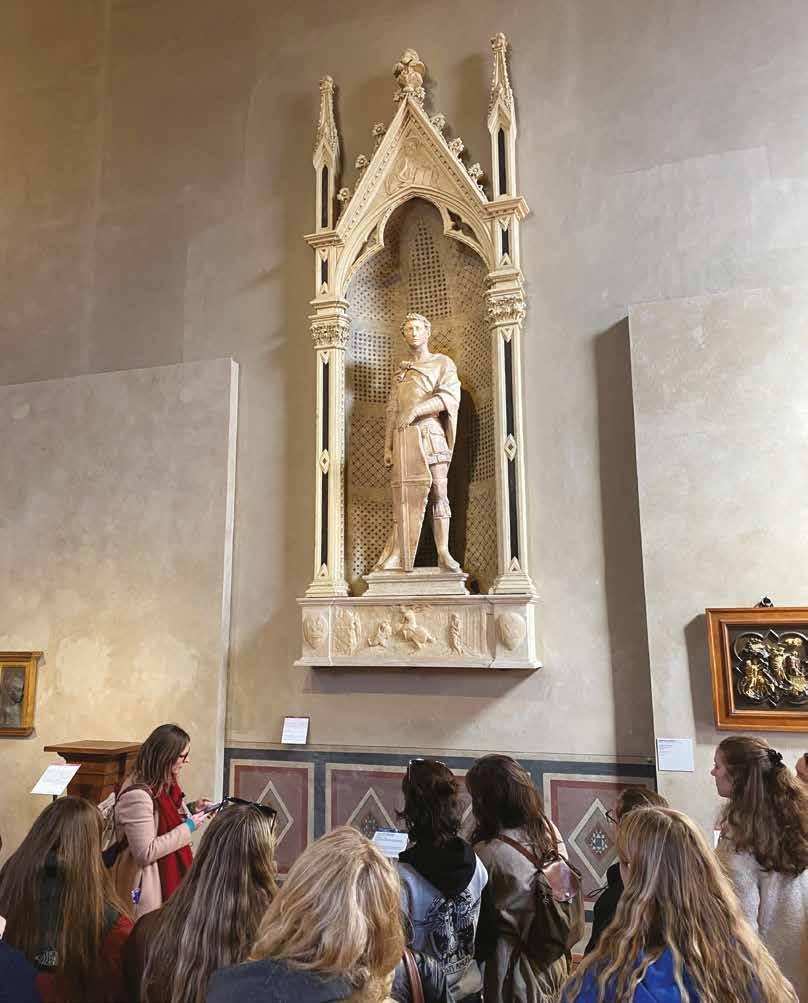
EDEXCEL 9HI0
History offers you the opportunity to investigate how and why societies have changed over a period of time. The course will help you to improve your analytical skills and offers opportunities for investigation and debate. Learn how to present a well-structured argument and to express your ideas clearly and confidently. History combines well with English, Languages, Classics, Geography, Politics and Economics; it also combines well with Maths and the Sciences. Students who study History have access to a wide range of career and higher education opportunities; their skills in communicating ideas and analysing material are valued by universities and employers.
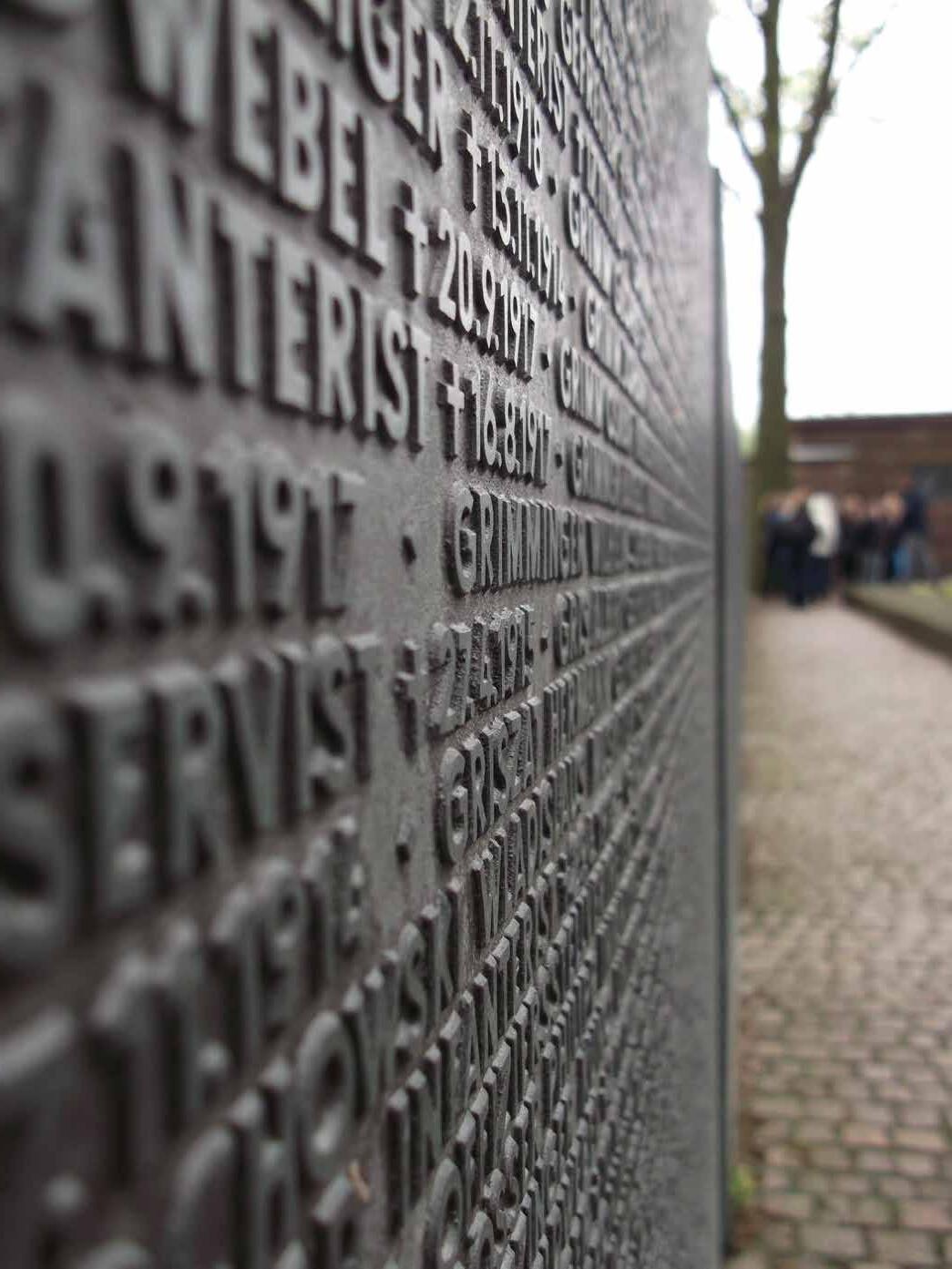
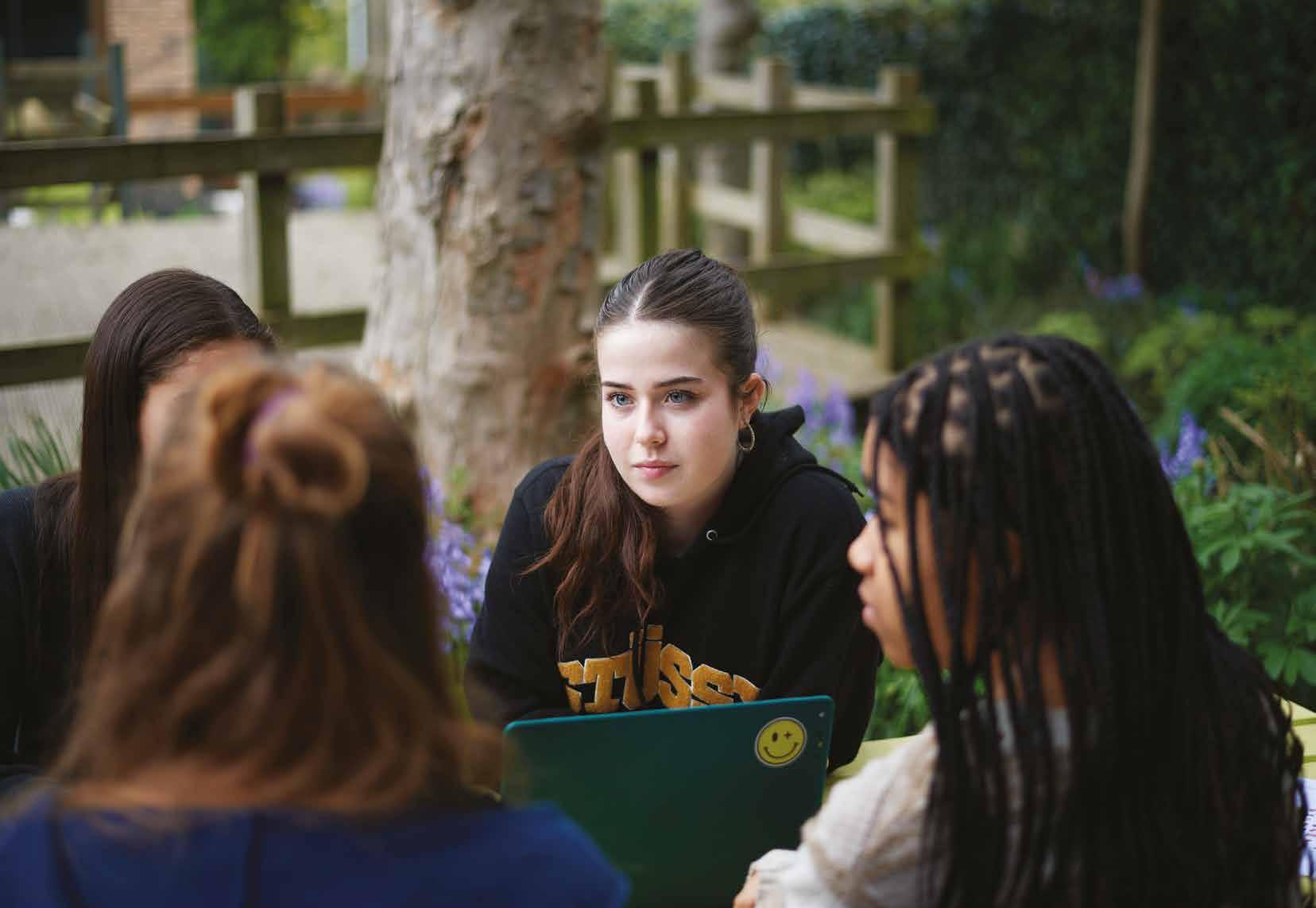
You should have gained at least a grade 8 in History, or a related discipline, at GCSE. You should also enjoy reading and wish to pursue the study of evidence. You should have an enquiring mind and an interest in the past and its relevance to current affairs.
We will follow Edexcel Route F ‘In Search of Rights and Freedoms.’
In Year 12 we will study two units. The first will be a study of the ‘USA, c.1917-1996: in search of the American Dream’. In parallel, pupils will study ‘India, c.1914-1948: the road to Independence’.

In Year 13 we will study one unit on a period of British History; this will be a study of ‘Rebellion and disorder under the Tudors, 1485–1603’. The second unit is coursework; students will complete an analysis of historical interpretations on a topic of their choosing.
This will give you a varied and exciting course covering a range of countries and periods; it will provide an excellent background to any student studying History at university.
This will include source-based questions and essays.
Three examined units at the end of Year 13 and one piece of coursework.

This course traditionally appeals to students with an interest in languages and the Arts. It is often combined with English and History, but its blend of logical thought and linguistic analysis also pairs well with Maths and the Sciences.
At least a grade 8 at GCSE Latin is a pre-requisite for A Level.
AND OUTLINE OF THE COURSE
In Year 12, we focus on language work and students revise all grammar from GCSE before expanding their knowledge of vocabulary, accidence and syntax.
The language papers taken in Year 13 examine unseen translation skills and either a comprehension exercise or prose composition (translation into Latin). A significant advance from GCSE will be the addition of unseen translation from Latin verse and students will translate verse passages drawn from Ovid as well as prose passages from Livy.
As at GCSE, the study of prose and verse literature comprises 50% of the examined material. Students will study the original work of authors such as Virgil, Apuleius, Tacitus, and Horace across both years of the course.

All assessment is via written examinations at the end of Year 13.
COURSES AND THE GDST PEARSON AND SILVER AWARD
Each year pupils studying classical subjects at Putney attend a range of summer schools in classical history, civilisation, and language. The GDST Pearson & Silver Awards offer financial support with the cost of attending these courses to pupils in Years 12 and 13. Applications are opened in February of each year and interested students should ask classics staff for further information.
EDEXCEL 9FM0
A grade 9 at GCSE is required. Pupils who take Further Mathematics will generally be in Set 1 in Year 11.
Pupils who choose Further Mathematics study for a qualification that is both deeper and broader than A Level Mathematics.
Further Pure Mathematics develops and expands on the algebra and calculus covered in A Level and introduces new material on topics such as complex numbers, matrix algebra, differential equations, series, vectors, hyperbolic functions and proof.
Mechanics is concerned with modelling physical situations. Topics covered include kinematics of a particle in a plane, centre of mass, work and energy, and collisions.
Statistics includes Poisson, Geometric and Binomial distributions, random variables, hypothesis tests, confidence intervals, Chi-squared testing and probability generating functions.
All examinations contain a mixture of length of question. There are four papers of 1½ hours each:
Pure Mathematics 1
Pure Mathematics 2
Further Mechanics 1
Further Statistics 1
This subject is available to pupils who have demonstrated a particular talent in Mathematics. Students taking Further Mathematics overwhelmingly find it to be an enjoyable, rewarding, stimulating and empowering experience.
For someone who enjoys Mathematics it provides a challenge and a chance to explore new and more sophisticated concepts. It will also enable you to distinguish yourself as an able mathematician in university and employment applications. Further Mathematics qualifications are prestigious and highly regarded.
Students who do Further Mathematics are demonstrating a strong commitment to their studies, as well as learning Mathematics which is very useful for any Maths-related degree (and other areas of study including Engineering, Sciences, Computing, Finance/Economics etc, as well as Mathematics itself). Studying Further Mathematics will also boost student’s performance in the standard A Level Mathematics and you should find the first year mathematics element of any Maths-related degree course far more straightforward.
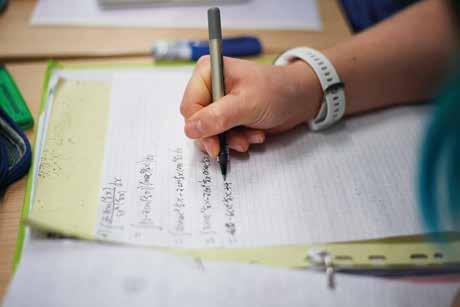

EDEXCEL 9MA0
As an A Level subject, Mathematics complements many other subjects, and is often taken in conjunction with subjects from the Arts and Humanities, as well as the Sciences. Further Mathematics, as an additional A Level, is available for those who wish to take their study to a greater and more rigorous depth and is strongly recommended for particularly talented students who are likely to want to study Engineering, Economics or Mathematics (alone or in combination with other subjects) at university. Universities often look favourably on Physics students who have undertaken Mathematics and Further Mathematics.
At least a grade 8 at GCSE is required.
The course structure is designed to develop understanding of Mathematics and mathematical processes in a way that promotes confidence and fosters enjoyment. You will develop abilities to reason logically, generalise and extend your range of skills to be used in more difficult, less structured problems compared to GCSE. The specification is split into the following categories: Pure Mathematics, Mechanics and Statistics.
understanding of algebra and a real familiarity with all its techniques are vital for success.
Mechanics is concerned with modelling physical situations and using the techniques of Pure Mathematics to solve problems involving such concepts as force, velocity, acceleration and centres of gravity, the underlying theme being Newton’s Laws of Motion.
Statistics is designed to encourage a mathematically analytical approach to practical situations and to develop mathematical models to assess probability and test hypotheses.

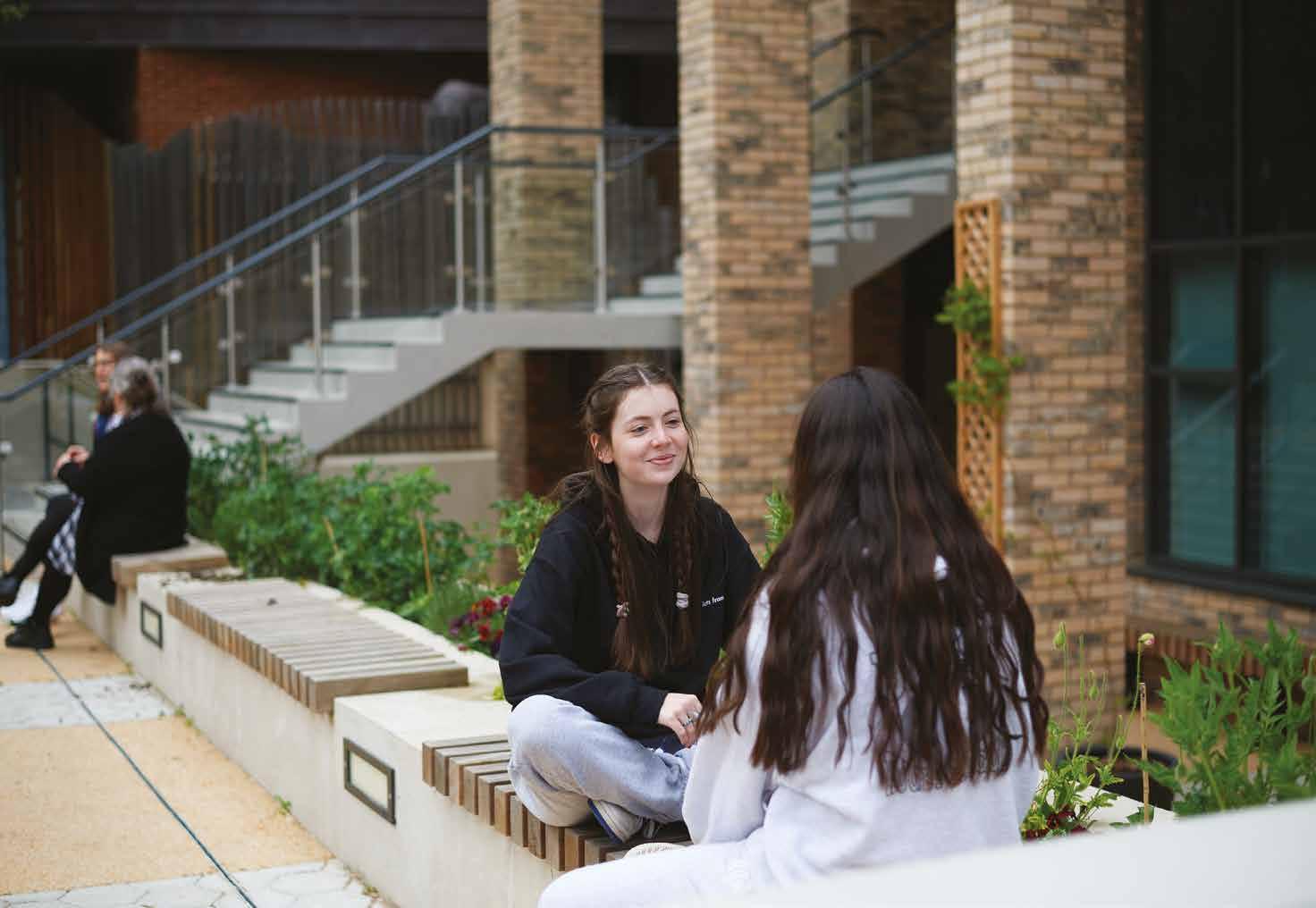
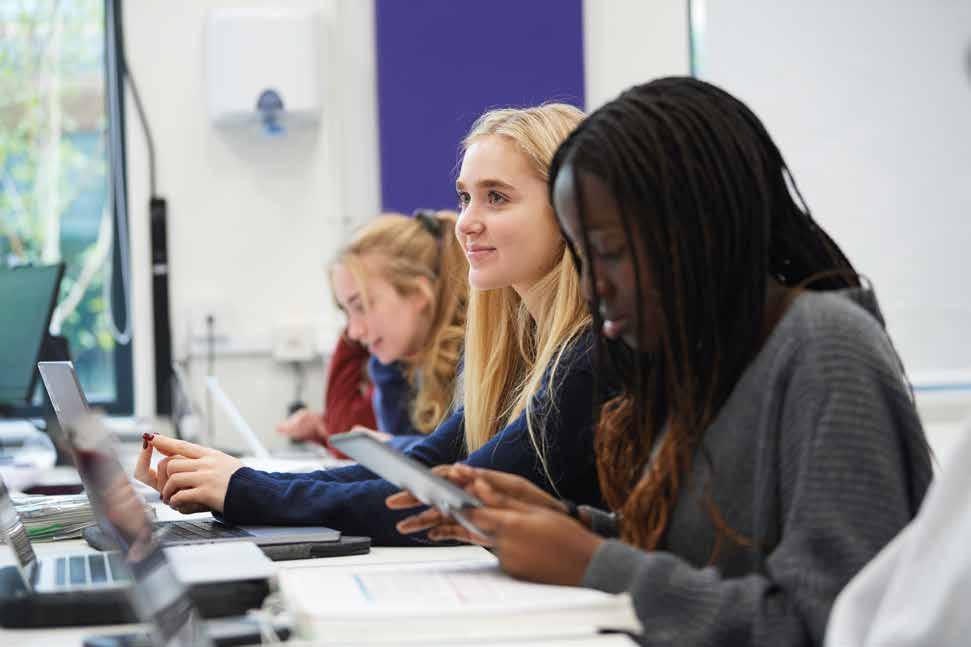

Languages combine superbly with any other subject and can be a useful contrasting subject if you are studying sciences or Mathematics. Language learning develops cognitive ability and is intellectually demanding. It also develops confidence and the ability to present your ideas on a broad range of topics, both in writing and in debate. Furthermore, contact with a different culture broadens the mind and language skills are much prized by employers in every field of work.

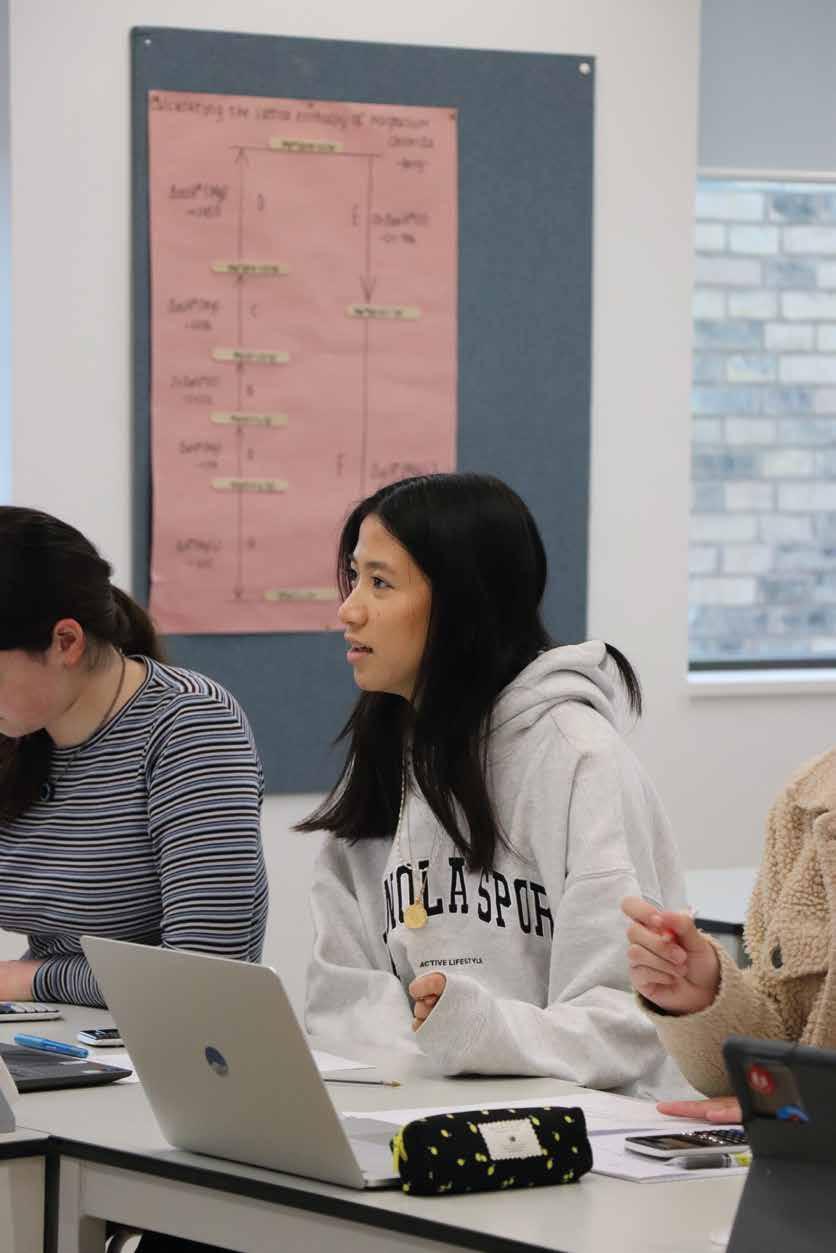
The course aims to encourage students to extend their abilities in all aspects of music, namely: performing, composing and appraising. Through the study of diverse set works alongside ample opportunities for practical music making in school, students attain a wide breadth and depth of understanding of all matters musical.
The A Level in Music can lead to further study in Music or Performing Arts. Equally, this subject is often a secondary component in either Arts or Science based courses. Career possibilities for musicians are as varied as the subject itself. Employers value musicians as good team players, as people capable both of understanding and interpreting complex instructions and of learning and using precise technical vocabulary. A surprising number of doctors and lawyers have music in their academic background.


A love of music! Also, a genuine interest and desire to study and analyse music at an advanced level. We expect pupils to have achieved at least a grade 8 at GCSE or an equivalent level via their individual instrumental/vocal studies. To access high marks for the performance, students should be at a good grade 8 level by the end of the spring Term of Year 13.
Year 12 course overview
Students begin the year focussing on area of study one: the Baroque concerti set works and area of study four: Music for Theatre. In the Spring term, The Marriage of Figaro is studied and analysed in detail with reference to wider listening that places them in their historical context (all from area of study one). Students also begin learning about the harmonisation of Bach chorales using a specially prepared booklet, which takes them through to Year 13. By the end of Year 12, they will have completed a Bach chorale in full. They will also have completed the first draft of their free composition, which is handed in at the end of the summer term.
Once termly (more if required), they will perform in a class concert that will be marked and assessed, according to the assessment criteria. This performance must be at least 10 minutes long.
Year 13 course overview
The Romantic piano set works from area of study one are learnt in the Autumn term of Year 13, as well as area of study three: Music for Media. Revision and consolidation of the other set works from Year 12 prepare them for the May examinations. Students can start work on

their Bach chorales on or after 15 September in assessment year. Performance recitals continue in class and are recorded between 1 March of assessment year until the deadline, 15 May of assessment year.
Performing is worth 35%. Students have to perform, either solo or with an ensemble, for a minimum of 10 minutes.
Composing is worth 25%. Students must compose at least two pieces. One must be a composition to a brief (the Bach chorale) and the other can be a free composition in any style. The minimum time for both combined compositions must be four and a half minutes.
Appraising is worth 40% and takes the form of a written exam. There is one compulsory area of study: Western classical tradition 1650-1910 and two further areas of study: Area of Study Three – Music for Media and Area of Study Four – Music for Theatre. The exam is made up of listening and analysis skills as well as an essay worth 30 marks.
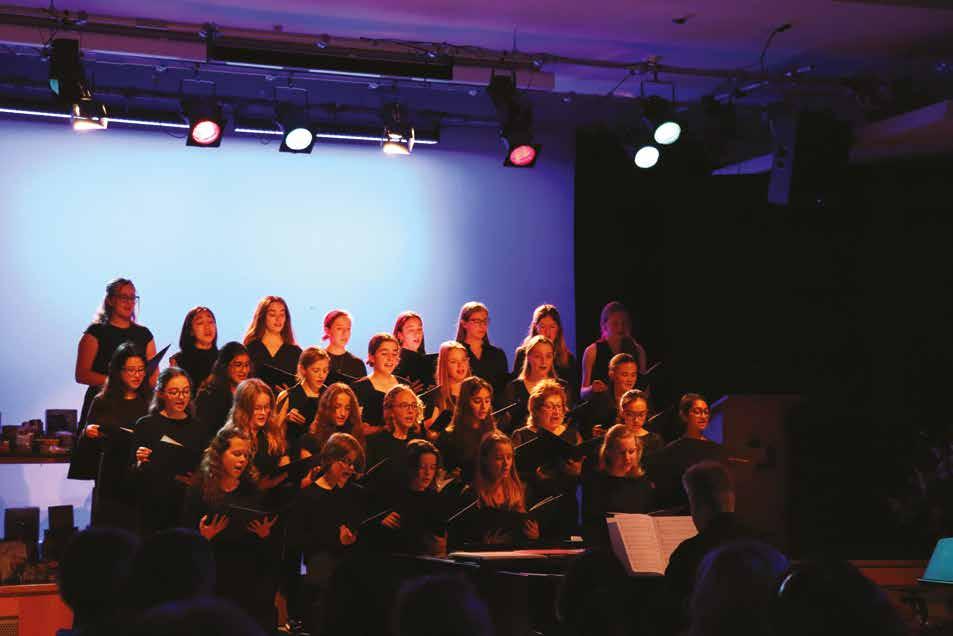
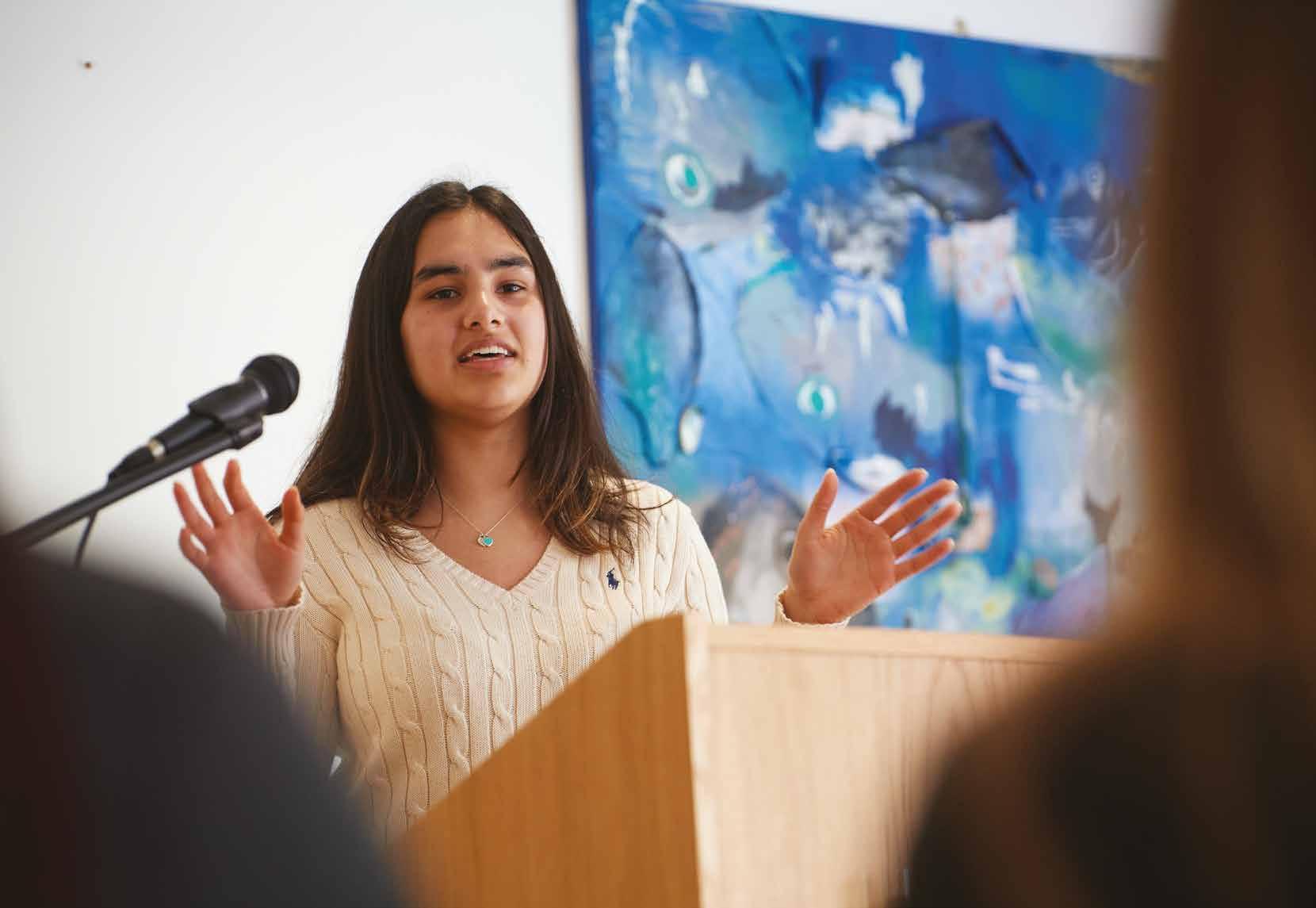
Studying Physical Education will give you an insight into all theoretical concepts of the sport you play. It covers the physiological, psychological, sociological and biomechanical aspects of sport and provides an in-depth understanding of how to improve your own and others’ performance.
A Level Physical Education is a respected subject, combining well with other Science and Arts A Levels.
If you love sport, this subject gives you the opportunity to learn more about an area in your life which you already enjoy. If you want to further your interests in sport at university or in a career, the syllabus provides a diverse range of options in which to specialise in the future. Careers in sport relating to performance, coaching, management, marketing and business are increasing

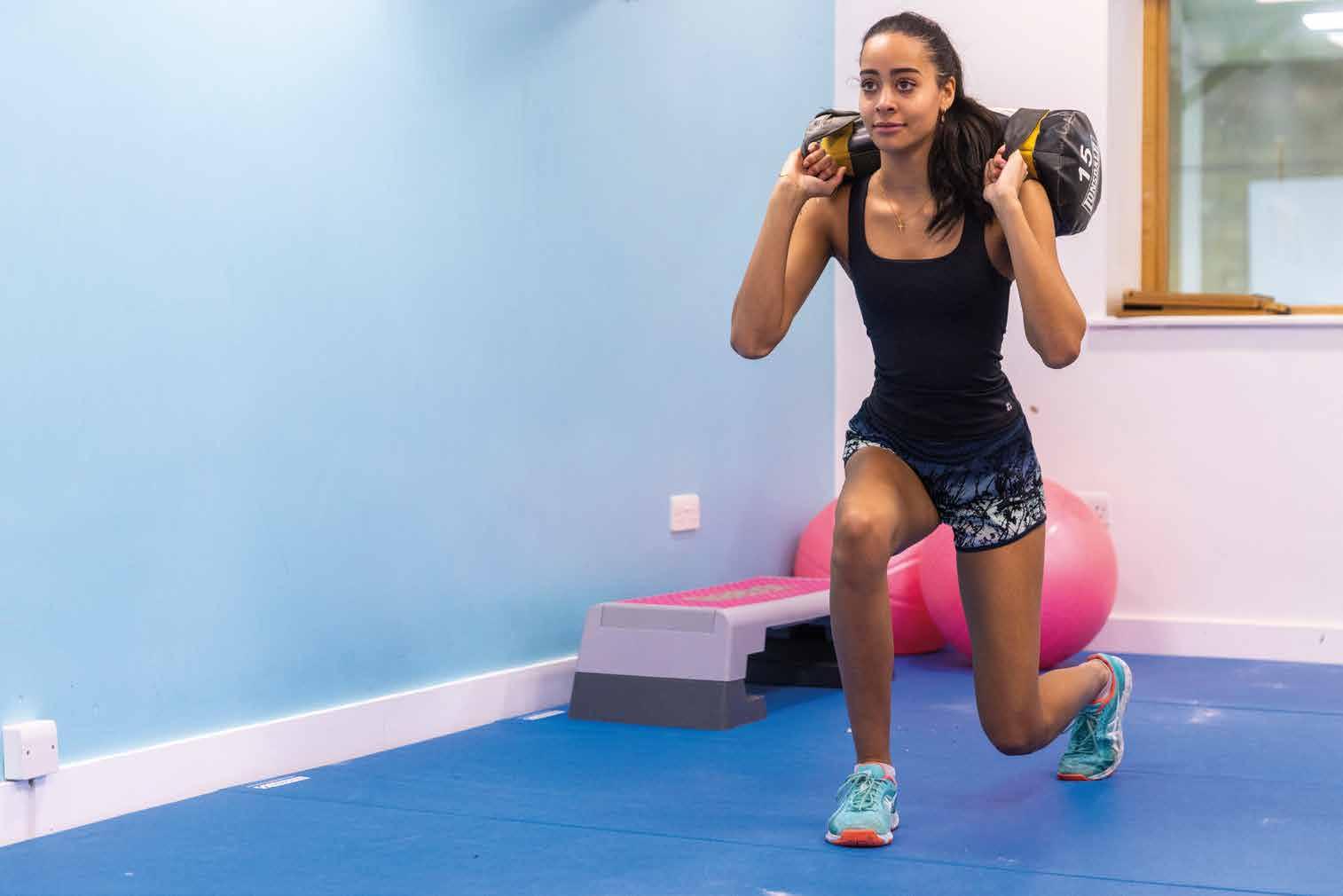
A grade 8 or higher for GCSE Biology or an A grade equivalent in the Biology component of Dual Award Science is required.
Ideally you will have studied GCSE Physical Education with at least a grade 8. An interest in sport and expertise in one sporting activity at a regional or national level.
At A Level the theory course consists of several sections; Anatomy and Physiology, Skill Acquisition, Sport and Society, Exercise Physiology, Biomechanical Movement, Sport Psychology and the Role of Technology.
Anatomy and Physiology involves studying the cardio respiratory system, the skeletal and muscular system and energy systems.
Skill Acquisition will require learning about skill and the transfer of skills, theories of learning and performance, use of feedback and guidance, memory models and information processing.
Sport and Society will involve studying pre-industrial, industrial, post-industrial and post-World War II Britain.
Exercise Physiology includes diet, training methods and injury.
Biomechanical Movement involves studying biomechanical principles, levers, linear motion, angular motion, projectile motion and fluid mechanics.
group dynamics, goal setting, attribution process, confidence and leadership.
The course also covers violence in sport, drugs and law in sport.
The practical assessment involves being assessed in one activity as a player/performer, plus analysing performance through an oral assessment (30 minutes).
Theory Knowledge and Understanding for the Active Participant
Three written papers: Paper 1 30% Applied Anatomy and Physiology, Exercise Physiology, Biomechanics, 2hr paper, 90 marks
Paper 2 20% Skill Acquisition and Sports Psychology, 1hr paper, 60 marks
Paper 3 20% Sport and Society, Contemporary Issues in Physical Activity and Sport, 1hr paper, 60 marks
Practical 30%
Non-Examined Assessment Students are assessed as a performer or coach in the full sided version of one activity. Plus a verbal analysis of performance, 90 marks

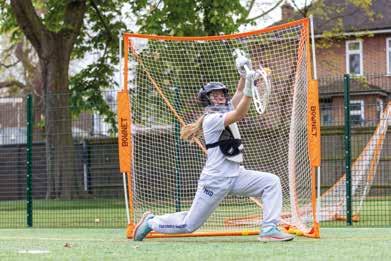
During the course you will learn about our current understanding of the universe, from the tiniest subatomic particles and the fundamental forces that dictate their behaviour, to the nature of stars, galaxies, space and time. By the end of the course, you will not only have learnt about how nature works, but equally importantly you will have developed a range of valuable skills including analytical, critical and creative thinking, the ability to collect, analyse and
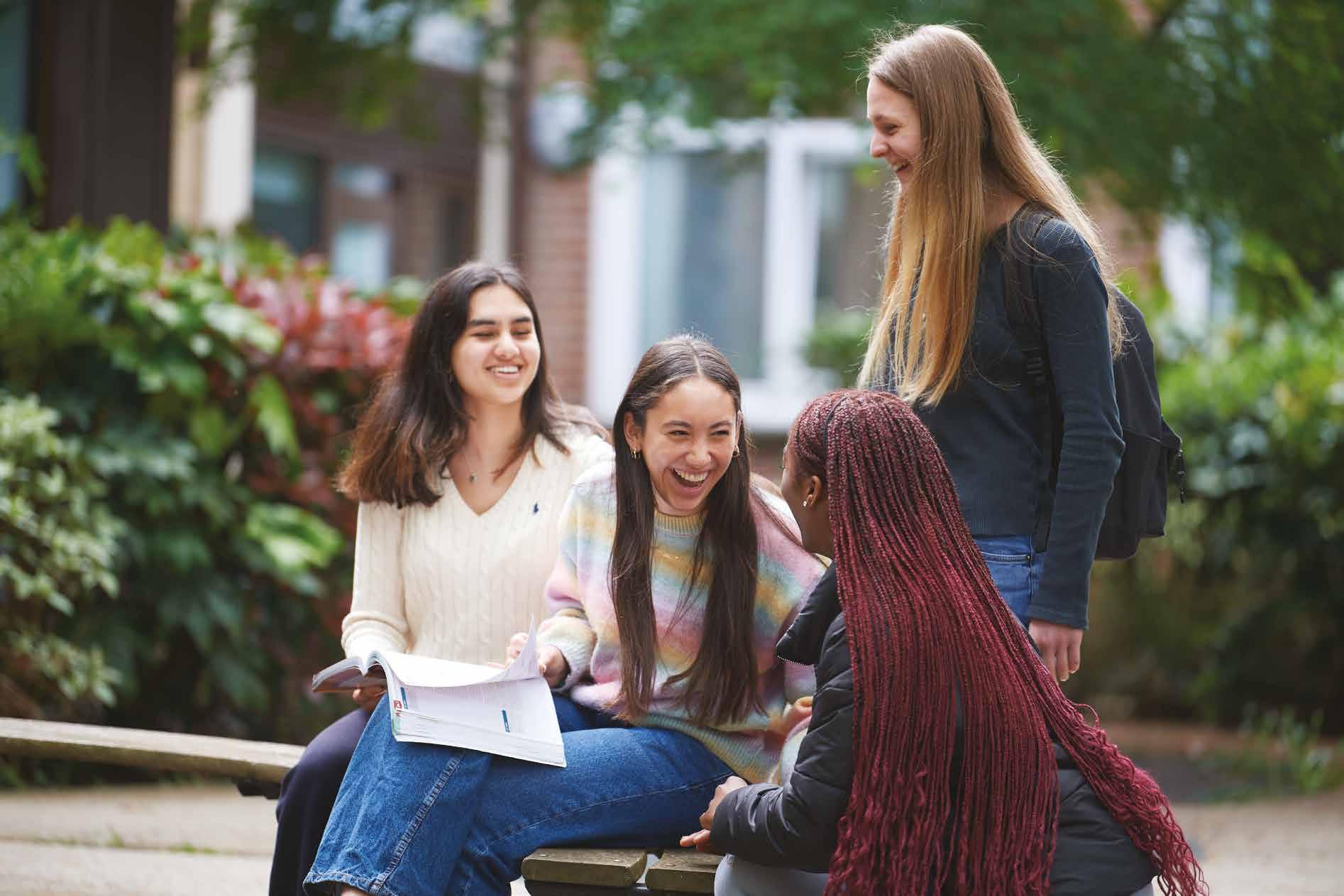


Generally, those who put the most into the subject gain the most satisfaction from it. Candidates taking A Level Physics will be expected to have at least a grade 8 in Physics GCSE. It is not necessary to take A Level Mathematics to study Physics to A Level, but students should have at least a grade 8 in Mathematics GCSE. (Students should note that it is difficult to study Physics beyond school without Maths A Level.)
Year 12
1 Measurements and their Errors: use of SI units and their prefixes, limitations of physical measurement, estimation of physical quantities.
2 Particles, Radiation, and Quantum Physics: Physics on the smallest scale, including new particles: quarks, leptons and mesons.
3 Waves and Optics: Progressive and stationary waves, interference, diffraction and refraction. A highly practical module including laser work.
4 Mechanics and Materials: Linear motion including accelerating bodies, Newton’s laws and momentum. Introduction to projectile motion.
5 Electricity: IV-characteristics, resistor networks and emf and internal resistance.
6 Further Mechanics and Thermal Physics: Periodic motion in a circle and of an oscillating object, and study of thermal energy transfer and the molecular kinetic theory model.
Year 13
7 Fields: Including Newton’s law of gravitation, orbits of planets and satellites, electric and magnetic fields, magnetic flux density and induction.
8 Nuclear Physics: The history of the atomic structure, radioactive decay, nuclear instability.
9 Astrophysics: Including classification of stars by luminosity, Doppler effect, detection of exoplanets and the history and future of the universe.
We follow the AQA A Level (7408/A). There will be three papers at the end of Year 13.
Paper 1 Topics 1–5 and Periodic Motion from topic 6.
Paper 2 will be on topics 6–8.
Paper 3 will be on Astrophysics, Data Analysis and Practical Skills.
Practical skills will be assessed internally by teachers and reported separately from the course grade.



If you feel it is important to understand the relationship between political ideas and political institutions, then this is the course for you! A study of Politics will provide you with the skills to become more critically aware of the nature of politics and political ideas both in the UK and USA. You will study several core political concepts, such as democracy, socialism, liberalism and feminism.
Politics is an academically rigorous subject that will give you the chance to argue your point of view cogently and persuasively and present a well-turned argument, both on paper and orally. The emphasis will be on analysis and investigation. Politics combines especially well with History, Economics, Languages, Classics and Geography but also has a significant contribution to make to the understanding of Maths and the Sciences.
There are no requirements for particular subjects at GCSE; instead you should have an enquiring mind and a zeal for current affairs. You should be keen to participate in active debate and have strong powers of expression. You will be expected to keep up-to-date with current affairs and read articles from newspapers and journals. You should also be able to evaluate both sides of an argument.
We will follow the AQA specification.
In Year 12 we will study UK politics with a focus on democracy and political participation in the UK and the structure of UK government. We will examine the nature and health of our democracy by investigating topics such as our electoral system, party structure and the role
of the media in politics. Our study of UK government will encompass an examination of our constitution, a study of the role of the executive and an analysis of the relationship between the three branches of government. We will also study US politics and examine the institutional framework of US government and consider the interrelationships between its legislative, executive and judicial processes and the health of US federalism.
In Year 13 we will study a range of political ideologies, such as conservatism, liberalism, socialism and feminism. We will be examining the core ideas and thinkers for these ideologies and will also be investigating the tensions and divisions within each ideology. We will also analyse the similarities and differences between the US and UK systems of government.
Three written examinations
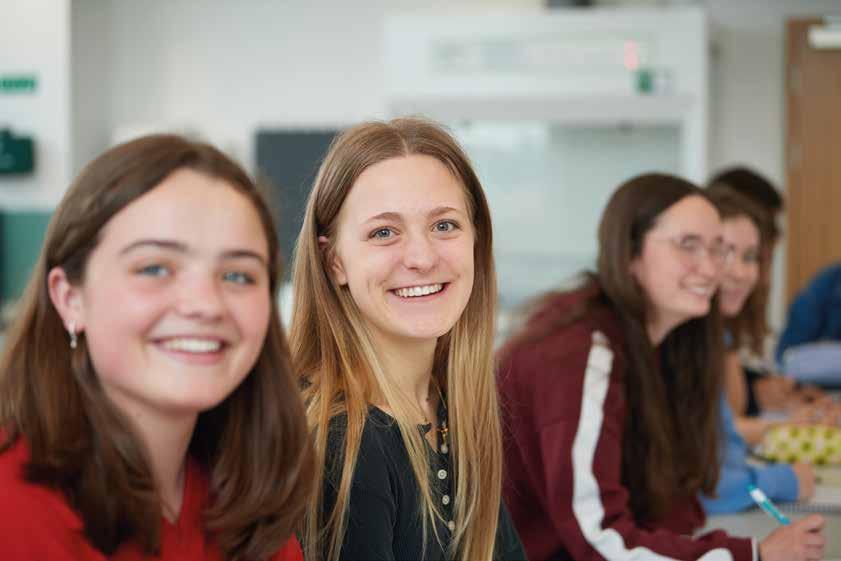

AQA 7182
Can we rely on eyewitness testimony? Why do people obey authority? How can we define what is ‘normal’? If you are curious to find answers to these questions then you will enjoy this subject.
Psychology is the science of human behaviour and mental processes. Students will learn a range of famous influential psychological experiments that have radically changed our knowledge of the brain and behaviour. Psychology bridges the gap between arts and sciences as scientific and written skills are assessed.
The department attends a variety of seminars and events including the Psychology Live conference in Disneyland Paris. It also organises a ‘Life Behind Bars’ conference, which includes hearing from ex-convicts and forensic psychologists.


The course is taught from first principles as it is assumed that no student has studied Psychology before. Skills in written communication, data interpretation and critical evaluation will be assessed. Therefore a grade 8 in English GCSE is required.
The A Level course also contains knowledge of inferential statistics as well as an increase in the biological content, therefore Maths and Biology GCSEs are relevant.
STRUCTURE AND OUTLINE OF THE COURSE
Paper 1 Introductory Topics in Psychology: Social Influence, Memory, Attachment, Psychopathology
Paper 2 Psychology in Context: Psychological Approaches, Biopsychology, Research Methods with statistics
Paper 3 Issues and Options in Psychology: Issues and debates: we choose three topics from: Relationships, Gender, Cognition and Development, Schizophrenia, Eating Behaviour, Stress, Aggression, Forensic Psychology and Addiction.
There is no coursework in Psychology A Level.
A mixture of multiple choice, short answers and 16 mark essays.

The A Level requires a mature response to evaluation, a deep understanding of research, as well as a broad range of reading.
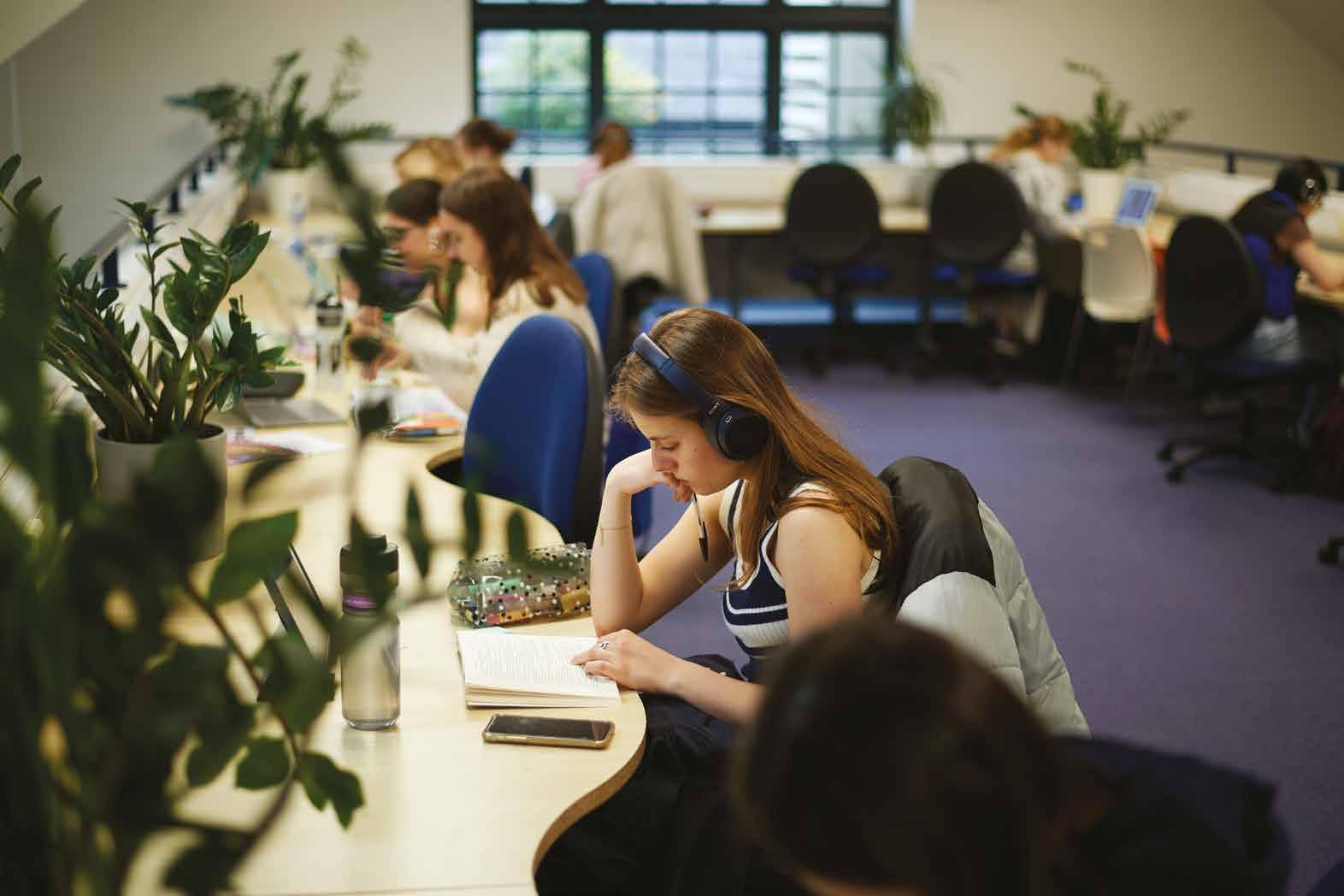
Religious Studies is an interesting and wide-ranging subject encompassing academic disciplines such as History, Literature and Philosophy. It also complements other Arts subjects which involve these disciplines. It will give you an understanding of how religion has had a profound influence on modern civilisation and how people approach decision-making about important moral and social issues. It will help you develop your own beliefs and attitudes and develop a range of transferable and valuable skills including critical thinking and reasoning.
Religious Studies GCSE offers useful, although not essential, background, but you will ideally have achieved a Grade 8–9 at GCSE in a related Humanities subject such as History or Geography. You don’t need to be religious, but you will need an interest in ethics and why people’s beliefs affect their lives.
Three modules are studied and each is examined at the end of the two-year course.
Philosophy of Religion – This includes a study of arguments for the nature and existence of God, and problems, questions and possibilities raised by this, such as the problem of evil and the belief in the afterlife. We also examine questions about religious experience, atheism, the relationship between religion and science, religious language (talking about God) and life after death. These are fundamental issues in classical philosophy of religion which go back to pre-theistic times.
Religious Ethics This includes a study of the relationship between religion and morality, ethical theories such as Utilitarianism, Natural Moral Law and Situation Ethics, Meta-ethics (using ethical language) and ethical dilemmas such as war and peace, the environment, medical ethics and sexual ethics.
Textual Studies This includes a study of the religious, social and political background to the life and ministry of Jesus, the identity of Jesus, the purpose and authorship of the gospels and ways of interpreting them, the Kingdom of God, and the crucifixion and resurrection of Jesus.
During the course of the Sixth Form, students will be set homework tasks including:
Preparing presentations and researching topics in advance of the lessons.
Reading set texts ahead of class
Writing exam style answers in and out of class
Completing replica exam assessments which are marked on the board criteria.
Three written papers, each of two hours on each module studied, are sat at the end of the second year. The papers will comprise a range of question types including structured questions, traditional essays and a stimulus response from an extract of text included in an anthology selected by the examination board.
Papers are marked out of 80 and an A*
